There's COVID-19 on nearly every cruise ship right now: Here's what cruisers need to know

Things are getting iffy again for cruisers -- at least for those with near-term bookings.
The ongoing surge in COVID-19 cases around the world is causing a growing number of disruptions to itineraries and even some last-minute cancellations of entire voyages.
The number of passengers being quarantined on ships (after testing positive for COVID-19) also is on the rise. And passengers who aren't COVID-19 positive are getting caught up in short-term quarantines for being "close contacts" of shipmates who are.
For more cruise guides, tips and news, sign up for TPG's cruise newsletter .
Meanwhile, just getting to ships is becoming increasingly stressful, as getting the pre-cruise COVID-19 test that's often required before cruising is getting more difficult . Plus, a "perfect storm" of soaring COVID-19 cases and rough winter weather has wreaked havoc with airline operations for weeks.
Still, the situation isn't anywhere near as dramatic or disruptive as what we saw at the start of the COVID-19 pandemic two years ago, when whole ships were being quarantined due to outbreaks of the illness and, eventually, the entire industry shut down.
As I saw myself during a cruise to Antarctica in recent weeks, many sailings are operating relatively normally, even when there are COVID-19 cases on board.
Here's a look at everything you need to know if you've got a cruise booked in the coming weeks -- or further out.

COVID-19 cases on ships are up a lot
While cruise ships have recorded relatively few cases of COVID-19 over the past year, in part due to unusually strict health protocols , the number of passengers and crew testing positive on ships has been rising sharply in recent weeks along with the greater surge on land.
At the end of December, the U.S. Centers for Disease Control and Prevention reported that 5,013 COVID-19 cases had been reported on cruise vessels operating in U.S. waters during the last two weeks of the month, up from just 162 cases during the first two weeks of the month.
That's a 3,094% increase.
Anecdotal reports are that the number of cases on ships is up even more in the first 10 days of the new year.
Notably, all 92 cruise vessels currently operating in U.S. waters have recorded at least a handful of COVID-19 cases in recent weeks, according to CDC data.
Still, it's important to note that most of these "cases" of COVID-19 are asymptomatic or mild, only discovered during routine testing. While some ships only are testing passengers who report feeling ill for COVID-19 (and close contacts of those who subsequently test positive), other ships are testing every single passenger at least once per voyage, sometimes more. One line, Viking , is testing every single passenger for COVID-19 every day.
Cruise lines also are testing all crew members regularly.
The result is the detection of many asymptomatic cases that otherwise would have gone undetected. This is a level of surveillance that is much greater than what is the norm for other travel venues such as land-based resorts or theme parks, and it can give the false impression that the positivity rate for COVID-19 on ships is unusually high as compared to other places.
If anything, the positivity rate is far lower on ships than on land, thanks to much stricter health protocols (more on that in a moment).
It's also important to note that the detection of COVID-19-positive passengers or crew on board your ship won't necessarily impact your sailing (unless you are among those testing positive).
Health authorities no longer are quarantining whole ships when a few -- or even a lot -- of passengers and crew test positive for COVID-19. The current protocol on most ships is to isolate COVID-19-positive passengers and crew but otherwise continue on with voyages as planned.
Your itinerary could change
While health authorities no longer are quarantining whole ships when a few passengers or crew test positive for COVID-19, the presence of the illness on board a vessel still could result in notable disruptions to your itinerary.
Cruise lines in recent weeks have faced a growing number of ports that are balking at allowing ships with COVID-19-positive passengers or crew to dock.
Several ships recently had to skip port calls in Mexico , for instance, after passengers and crew on board the vessels tested positive for COVID-19. The ports have since reopened after Mexico's Health Department overruled the decisions of local port officials.
Cruise ships also have had to cancel stops recently at the islands of Aruba, Bonaire and Curaçao, and at San Juan, Puerto Rico, due to local worries about COVID-19-positive passengers and crew on board and/or tighter COVID-19-related entry requirements.
Lines also are dealing with a small but growing number of destinations -- India and Hong Kong, for example -- that are at least temporarily closing to cruising completely, even for ships where no one has tested positive for COVID-19.
Viking on Sunday was forced to announce a major revision of its soon-to-begin, 120-day world cruise after India notified the line it was closing to cruise ships. Viking's 930-passenger Viking Star will begin its world cruise this week by heading south from Los Angeles to Central America and South America instead of sailing westward toward Asia, where it was scheduled to spend a significant amount of time in India.
Your cruise could be canceled on short notice
A growing number of cruise lines are canceling sailings on short notice, citing the disruptions caused by COVID-19. The world's largest cruise operator Royal Caribbean on Friday canceled soon-to-depart sailings on four of its 25 ships, including the next three departures of the world's largest ship, Symphony of the Seas .
Norwegian Cruise Line on Wednesday canceled soon-to-depart voyages on eight of its 17 ships.
Other lines canceling one or more sailings in recent days include Holland America , Silversea , Atlas Ocean Voyages, Regent Seven Seas Cruises, MSC Cruises , Costa Cruises and Oceania Cruises .
The cancellations come as lines struggle to maintain adequate staffing levels on some ships due to crew members testing positive. When crew test positive, they and their close contacts must stop working and isolate, even if asymptomatic, leaving shipboard venues short-staffed.
You probably won't be quarantined, stranded or stuck
As noted above, health authorities no longer are quarantining whole ships when a few -- or even a lot -- of passengers and crew test positive for COVID-19.
The current protocol on most ships is to quickly isolate COVID-19-positive passengers and their close contacts. But only the COVID-19-positive passengers are being isolated long term.
As my colleague Ashley Kosciolek experienced first-hand on a cruise in 2021, close contacts only are being isolated for a short period while they are tested for COVID-19. If they test negative, they typically are allowed out of their rooms to rejoin the rest of their fellow cruisers on board.
This means that many sailings are going ahead as planned, with little disruption, even when some passengers and crew on the trips test positive for COVID-19. I experienced this myself in late December when on a Silversea vessel where four passengers tested positive for COVID-19. Some passengers who were deemed close contacts of the passengers who tested positive were isolated for a short period while being tested for COVID-19. But the positive cases had little impact on most of the passengers on board the vessel, and the voyage went ahead as planned.
Such a protocol comes at the recommendation of the CDC, which has set guidelines for how cruise lines should respond to COVID-19-positive cases on board ships, and it has worked well for the past year .
Of course, if you do test positive for COVID-19 on a ship, you will, unfortunately, face what could be several days of isolation in a cabin on a ship or on land. If you are an American cruising overseas, you also won't be able to return to the U.S. until you have tested negative for COVID-19 (or until you recover from the illness and are cleared in writing to travel by a licensed healthcare provider or a public health official).
This is one of the biggest risks of taking a cruise right now, and one reason you may consider canceling a sailing scheduled in the short term (see the section on more-flexible cancellation policies below).
Most COVID-19 cases on ships aren't serious
Cruise lines are reporting that the vast majority of passengers testing positive for COVID-19 in recent weeks are asymptomatic or have mild symptoms.
All major cruise lines currently are requiring all or nearly all passengers to be fully vaccinated for COVID-19, with some also starting to require booster shots , to boot. This creates an onboard population that is far less likely to experience serious symptoms of COVID-19 than a cross-section of people on land, according to CDC data.
For all adults ages 18 years and older, the cumulative COVID-19-associated hospitalization rate is about eight times higher in unvaccinated persons than in vaccinated persons, according to the latest CDC data.
You'll face lots of new health protocols
If you haven't cruised since before the pandemic, you might be surprised by how many new health- and safety-related policies cruise lines have implemented to keep COVID-19 off ships.
For starters, there are the vaccine mandates noted above. No other segment of the travel industry has been as uniform in requiring almost every customer to be fully vaccinated against COVID-19.
Related: Will I need a COVID-19 vaccine to cruise? A line-by-line guide
As noted above, cruise lines also are requiring passengers to undergo COVID-19 tests before boarding ships -- a screening process that is keeping many COVID-19 positive people from ever stepping on board a vessel.
When COVID-19 is detected on a ship, cruise lines sometimes then test passengers multiple times to ensure it isn't spreading. On my recent trip to Antarctica, I underwent six COVID-19 tests in just eight days -- three in advance of stepping on board the vessel (including a PCR test required by Chile, where my trip began) and three while on board.
In addition, most cruise lines now are requiring passengers to wear masks at all times while in interior spaces of vessels, and they have stepped up cleaning regimens, improved air filtration systems on ships and made other onboard changes.
The CDC says to avoid cruising for now
On Dec. 30, the CDC added cruise ships to its list of "Level 4" destinations you should avoid visiting for now due to high levels of COVID-19.
For what it's worth, more than 80 countries around the world -- including a good chunk of all the places you might want to travel -- are on this list. So, the CDC is basically telling you that now isn't a good time to travel. Fair enough. But the warning shouldn't be seen as a call-out on any elevated risk to cruising as opposed to visiting other places, per se.
Places on the Level 4 list currently include Canada, much of Europe and nearly every country in the Caribbean.
The cruise industry has been highly critical of the designation, arguing that cruise ships are far safer places to be right now than almost anywhere else, given their strict health protocols.
"The decision by the CDC to raise the travel level for cruise is particularly perplexing considering that cases identified on cruise ships consistently make up a very slim minority of the total population onboard — far fewer than on land — and the majority of those cases are asymptomatic or mild in nature, posing little to no burden on medical resources onboard or onshore," the main trade group for the industry, the Cruise Lines International Association, said in a statement to TPG.
You can cancel if you're worried (in many cases)
If you're booked on a cruise in the coming weeks, and you're having second thoughts, there's a good chance you can get out of your trip. Many lines continue to be far more flexible than normal about cancellations.
Take cruise giant Carnival Cruise Line . Its current flexible cancellation policy allows passengers to cancel as long as a public health emergency remains in effect and receive 100% of the cruise fare paid in the form of a future cruise credit. Passengers are also able to cancel if they test positive for COVID-19. (Proof of a positive test result is required.)
Another large line, Norwegian, just last week extended its pandemic-era Peace of Mind policy to allow passengers to cancel any sailing taking place between now and May 31. For now, the cancellation needs to be done by Jan. 31, and the refund would come in the form of a future cruise credit to be used on any sailing that embarks through Dec. 31.
That means you could call the line right now to back out of a cruise that is just days away. In normal times, you'd lose all your money if you backed out of a seven-night Norwegian cruise with fewer than 31 days' notice.
Planning a cruise? Start with these stories:
- A beginners guide to picking a cruise line
- The 5 most desirable cabin locations on any cruise ship
- The 8 worst cabin locations on any cruise ship
- A quick guide to the most popular cruise lines
- 21 tips and tricks that will make your cruise go smoothly
- 15 ways cruisers waste money
- What to pack for your first cruise
- Search Please fill out this field.
- Manage Your Subscription
- Give a Gift Subscription
- Newsletters
- Sweepstakes
Every Cruise Line's Requirements for COVID Vaccines, Testing
A guide to every major cruise line's health requirements for safe sailing.
:max_bytes(150000):strip_icc():format(webp)/alison-fox-author-pic-15f25761041b477aaf424ceca6618580.jpg)
Cruise lines have shifted their requirements for passengers, making cruising accessible to practically everyone. Many popular cruise lines have eliminated the vaccine and pre-embarkation test as the industry is beginning to shift away from mandatory vaccines and testing.
The changes began shortly after the CDC ended a pandemic-era policy of publicly displaying COVID-19 cases onboard, different cruise lines to the public in July 2022. For those looking to check current COVID-19 trends onboard the CDC urges direct contact with the cruise line, and the organization will continue to monitor and offer guidelines to ships.
Below, we break down each line's list of regulations to sail as well as what travelers need to know to plan.
Avalon Waterways
Where they sail: These small-ship river cruises sail throughout Europe, Asia, South America, and down the Nile River in Egypt.
Who needs the vaccine: All international travelers from the U.S. must be fully vaccinated before boarding. Beginning March 2023 the vaccine is no longer required (but strongly encouraged).
What other safety measures are in place: All guests will undergo a health screening upon arrival and luggage will be disinfected. Avalon will provide COVID-19 testing for travelers who need to show proof of a negative test to return home at no extra cost. Depending on the location of the cruise a pre-departure COVID-19 test may or may not be required.
Find out more: Avalon Waterways
Where they sail : Azamara sails mid-size ships all over the world, to all seven continents.
Who needs the vaccine : All guests and crew 12 and older will be required to be fully vaccinated at least two weeks before boarding a ship. Beginning Dec. 1, 2022, the company plans to drop the vaccine requirement for departures from the U.S. and Europe.
What other safety measures are in place : Depending on the port of embarkation guests may or may not to pre-test to travel. For a full list of ports and whether they require a test guests can check online .
Azamara's ships have been upgraded with new HVAC filtration systems, and EPA-certified disinfectants are used to clean the ship.
Find out more : Azamara
Carnival Cruises
Where they sail: Carnival sails large ships around the world, including popular trips to the Caribbean. The company sailed its maiden voyage on the Mardi Gras out of Florida in July.
Who needs the vaccine: All guests are encouraged to be vaccinated but unvaccinated travelers, or vaccinated guests without proof of vaccination, will have to present the negative results of a PCR or antigen test taken no earlier than 3 days before sailing.
What other safety measures are in place: For cruises five days or less, there will no longer be pre-cruise testing for vaccinated passengers unless a specific port requires it. Itineraries including Bahamas, Bermuda, or Grand Cayman will still be required to test. All guests will also be required to fill out a health screening 72 hours before embarkation and undergo health screenings prior to boarding. Unvaccinated travelers on a cruise to Bermuda will be required to purchase travel insurance (children under 12 are exempt as long as they are traveling with vaccinated parents).
Both vaccinated and unvaccinated guests who have recovered from COVID-19 within three months of their sailing date, do not need the required pre-cruise COVID test before embarkation, only if they are at least 10 days past their COVID-19 infection, have no symptoms and present documentation of recovery from COVID-19 from their healthcare provider.
Find out more: Carnival Cruise Line
Celebrity Cruises
Where they sail: Celebrity Cruises sails all over the world.
Who needs the vaccine: The vaccine is no longer required to sail on cruises from the U.S. and Europe. A vaccine is required for sailings visiting Canada.
What other safety measures are in place: A pre-embarkation test is no longer required for vaccinated guests on sailings nine days or less. Unvaccinated passengers will still be required to test three days prior to sailing. Self-tests are acceptable from European and U.S. ports that don't stop in Bermuda or Canada.
Find out more : Celebrity Cruises
Where they sail: Cunard, which sails all over the world, is known for its transatlantic journeys aboard the Queen Mary 2.
Who needs the vaccine: All guests 18 and older must be fully vaccinated. Unvaccinated passengers under 18 will be required to undergo a PCR test within 72 hours of their departure.
What other safety measures are in place: Cunard has "enhanced" their onboard ventilation systems and implemented mandatory mask-wearing policies indoors. All guests aged 4 and older are required to have a negative COVID-19 test before boarding. Crew will be tested regularly while on board. Guests who have certain pre-existing medical conditions, including those who are on supplementary oxygen, will not be allowed to board.
Disney Cruise Line
Where they sail: Disney sails family-friendly journeys including to the Caribbean, Europe, and Alaska.
Who needs the vaccine: Vaccination is no longer required by highly suggested.
What other safety measures are in place: Unvaccinated guests must provide results of a COVID-19 test taken 1 to 2 days before sail date, at home tests are not accepted, this requirement will end Nov. 14. The Cruise line also has a full list of enhanced cleaning protocols.
Find out more: Disney Cruise Line
Grand Circle Cruise Line
Where they sail: Grand Circle Cruise Line sails small ships and river cruises all over the world, including an extensive list of European itineraries. The company plans to start sailing again in August, including to Greece, Turkey, and Italy.
Who needs the vaccine: All guests and crew are required to be fully vaccinated with the booster shot.
What other safety measures are in place: All ships have been equipped with High Efficiency Particular Air (HEPA) filters and buffets have been eliminated. The cruise line states some itineraries will require proof of a negative COVID-19 test prior to travel , and that instructors will be sent out 30 days prior to travel.
Find out mor e: Grand Circle Cruise Line
Holland America
Where they sail: Holland America sails large ships all over the world, including to the Mediterranean, Caribbean, Europe, and more.
Who needs the vaccine: Unvaccinated guests are welcome but will be required to self-test three days before cruising.
What other safety measures are in place: Vaccinated passengers traveling on ships for less than 16 days excluding itineraries with the Panama Canal, trans-ocean, and other selected itineraries will no longer be required to test.
Lindblad Expeditions
Where they sail: Lindblad Expeditions is known for its adventurous trips to hard-to-reach destinations like Antarctica and the Russian Far East, partnering with National Geographic to add to the experience.
Who needs the vaccine: All guests 12 and older need to be vaccinated before boarding. Boosters are recommended but not required.
What other safety measures are in place: Pre-departure testing will not be required unless for a specific destination.
Margaritaville at Sea
Where they sail: Margaritaville at Sea offers 3-day cruises to Grand Bahama Island departing from the port of Palm Beach. The cruise line also offers the opportunity to take the ship one way to the Bahamas to allow guests to stay at the Margaritaville resort, and then take the ship back to the Bahamas at a later date.
Who needs the vaccine: All guests are welcome regardless of vaccination status, according to the cruise line.
What other safety measures are in place: All crew members must be vaccinated for COVID-19 and the cruise line states there are vaccination requirements on board (but does not specify).
Find out more: Margaritaville at Sea
MSC Cruises
Where they sail: MSC Cruises sails large ocean cruises around the world, including throughout Europe, South America, the Persian Gulf, and the Caribbean. In August, the company started sailing to the Bahamas with a stop at its private island, Ocean Cay.
Who needs the vaccine: Vaccinations are recommended but no longer required.
What other safety measures are in place: Fully-vaccinated passengers are no longer required to show proof of a negative test unless it is required of the destination. Unvaccinated children must show proof of a negative PCR test.
Norwegian Cruise Line
Where they sail: Norwegian sails big ocean cruises all around the world, including popular itineraries all throughout the Caribbean and Greece.
Who needs the vaccine: All passengers may sail regardless of vaccination status.
What other safety measures are in place: Testing is no longer required for any passenger regardless of vaccination status with the exception of local government mandates.
Find out more : Norwegian Cruise Line
Oceania Cruises
Where they sail: Oceania Cruises sails all over the world, including offering several World Cruise itineraries.
Who needs the vaccine: All passengers regardless of vaccination status are allowed to sail.
What other safety measures are in place: Only unvaccinated guests will be required to show proof of a negative PCR or antigen test taken 72 hours prior to boarding. Unvaccinated children aged 12 years and younger are exempt.
P&O Cruises
Where they sail: The UK-based cruise line sails around Europe, including to the Canary Islands, as well as to the Caribbean from Southampton in the UK.
Who needs the vaccine: Although P&O Cruises' policy states that passengers over the age of 15 are required to be vaccinated, the latest update on its website says guests will be contacted directly in regards to vaccination protocol.
What other safety measures are in place: All guests are required to undergo a COVID-19 test at the terminal. Masks will be required on board indoors, and all shore excursions will be with vetted operators.
Princess Cruises
Where they sail: The global cruise line sails large ocean ships all around the world, from Australia to Alaska.
Who needs the vaccine: All guests are welcome on board, but unvaccinated passengers will be required to test and may need an additional medical exemption at some ports.
Regent Seven Seas Cruises
Where they sail: Regent Seven Seas offers all-inclusive luxury cruises around the globe, which include perks like free airfare, free excursions, and complimentary unlimited drinks on board.
Who needs the vaccine: All guests are now welcome. Unvaccinated passengers will be required to test 3-days before embarkation.
What other safety measures are in place: Pre-departure testing may not be necessary depending on the port. Currently cruises leaving from Bermuda, Canada, and Greece will require a test.
Royal Caribbean International
Where they sail: Royal Caribbean sails large ocean ships all over the world, including many popular itineraries throughout the Caribbean and Asia.
Who needs the vaccine: Everyone is welcome regardless of vaccination status, passengers traveling to Bermuda or Canada are required to be vaccinated.
W hat other safety measures are in place: On Royal Caribbean, unvaccinated travelers 12 and older leaving from a U.S. or Caribbean port still have to get tested within three days of embarkation, according to the cruise line , vaccinated guests are exempt.
Royal Caribbean will accept a variety of tests as proof to board, including simply taking a photo of a self-administered home test.
Find out more : Royal Caribbean International
Where they sail: The British cruise line, exclusively for guests 50 and older, sails both ocean and river cruises around the globe.
Who needs the vaccine: All guests must be fully vaccinated, including a booster shot at least 14 days before boarding a ship. Saga was the first major cruise line to implement this vaccination policy.
What other safety measures are in place: Ocean Cruise guests will be required to get tested for COVID-19 in the terminal. Masks are required on bus transfers, in hotels, and on excursions.
Find out more : Saga
Where they sail: Seabourn's mid-size luxury cruises head all around the world, from Alaska to the Caribbean.
Who needs the vaccine: Vaccinations are not required on most cruise itineraries, unvaccinated guests will be required to present a negative test taken within three days of embarkation.
What other safety measures are in place: Masks are recommended onboard in most indoor venues and the casinos are frequently sanitized.
Where they sail: Silversea brings guests all around the world in luxury and style, including to the Galapagos and Antarctica.
Who needs the vaccine: All guests are welcome, however, unvaccinated guests may not be welcome on all sailings depending on local regulations.
What other safety measures are in place: Vaccinated guests do not need a pre-departure test unless local regulations such as cruises leaving from Australia, Bermuda, Canada, or Greece require it. Unvaccinated travelers will need a negative COVID-19 test within 72 hours of embarkation.
UnCruise Adventures
Where they sail: This small-ship company is known for its Alaska journeys as well as adventures in places like the Galapagos and island hopping in Hawaii.
Who needs the vaccine: As of April 7, all guests are welcome on board regardless of vaccination status.
What other safety measures are in place: Guests will no longer be required to present proof of vaccination or a COVID-19 test prior to, or during any point of sailing and the cruise line will no longer be running at limited capacity. These measures go into effect on April 7, until then guests 12 and older must provide proof of vaccination, and itineraries may sail at less then full capacity.
Masks are required in public spaces, according to the company "bandana" and "buff" face masks will not be accepted.
Victory Cruise Lines
Where they sail: Victory Cruise Lines is known for its Great Lakes cruises, providing all-inclusive sailings to see breathtaking sights from Niagara Falls to the iconic architecture of Chicago from Lake Michigan. Beyond the U.S., Victory Cruise Lines sails to Mexico's Yucatán Peninsula.
Who needs the vaccine: All guests and crew will be required to be vaccinated before boarding, and will be required to show physical proof prior to boarding.
What other safety measures are in place: Testing is no longer required on any river cruise.
Luggage is then disinfected before being brought onto the ship and staterooms cleaned with electrostatic fogging. Masks will be required during the embarkation process and while riding a shore excursion bus, but will not be required on board.
Viking Cruises
Where they sail: Viking sails ocean and river cruises all over the world, including throughout Europe. This summer, Viking will sail several voyages, including around England for UK residents, to Bermuda, and to Iceland in June.
Who needs the vaccine: All guests must be fully vaccinated to board a ship. Guests who are eligible must have a booster.
What other safety measures are in place: In addition to vaccines, all guests may be required to undergo a saliva PCR test at embarkation as well as "frequent" testing throughout the journey. All staterooms are equipped with independent air handling units.
Virgin Voyages
Where they sail: The brand-new cruise line is launching mini sailings from England for UK residents, and has cruises throughout the Caribbean, and transatlantic options.
Who needs the vaccine: All are welcome regardless of vaccination status, the cruise line removed all vaccine and testing requirements for all its ships in late October, according to the company.
What other safety measures are in place: Virgin Voyages was the first cruise line to eliminate pre-departure testing for vaccinated guests. The cruise line will continue to work with an advisory board to help ensure health and safety on board at all times, including the use of air filtration systems and sanitization of high touch surface areas.
Find out more : Virgin Voyages
Windstar Cruises
Where they sail: Windstar operates small-ship cruises and several sailing vessels all around the globe, including to places like Central America .
Who needs the vaccine: All guests will be required to be fully vaccinated at least 14 days before boarding one of Windstar's yachts. Boosters are highly encouraged and are recommended to be administered at least one week prior to travel.
What other safety measures are in place: Guests no longer need a pre-embarkation test unless a specific destination requires it.
Alison Fox is a contributing writer for Travel + Leisure. When she's not in New York City, she likes to spend her time at the beach or exploring new destinations and hopes to visit every country in the world. Follow her adventures on Instagram .
Related Articles
What’s it like to go on a cruise now? Here’s how COVID changed the onboard experience
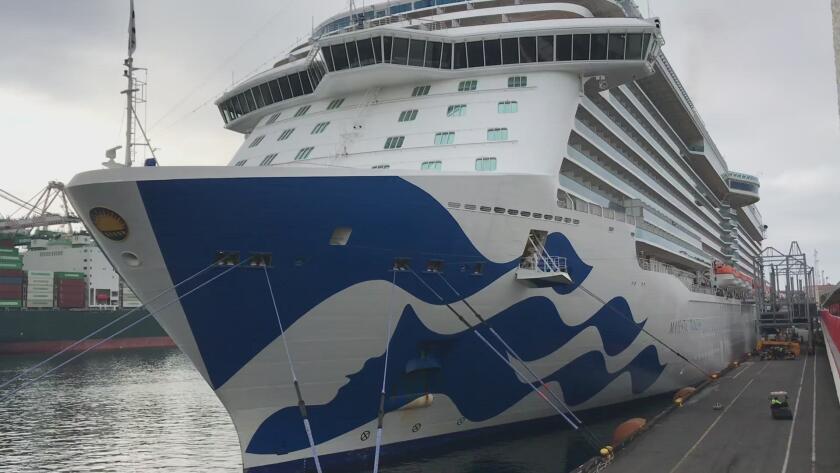
Cruise passengers will see a lot of changes on the ship due to the pandemic.
- Show more sharing options
- Copy Link URL Copied!
The cruise industry suffered its biggest financial blow in decades when the COVID-19 pandemic halted most sailings for months and made nervous cruise fans think twice about booking an ocean voyage.
But cruising is back and all signs point to a turn of the tide for the industry: More cruises are scheduled to depart the Port of Los Angeles next year than in 2019.
Carnival Corp., the world’s largest cruise company, reported that bookings for the second half of 2022 already surpassed bookings for 2019. Royal Caribbean cruises for 2022 are nearly at 2019 levels, the company’s chief financial officer, Jason Liberty, said on a recent earnings call.
Despite the shutdown, the world’s cruise lines have more than 100 new ships on order to set sail by 2027. The Majestic Princess, a ship designed to serve the Chinese market, made its maiden call from the Port of L.A. on Oct. 6. Some 200 cruises are scheduled to depart from there in 2022, up from 120 in 2019.
What are cruise lines requiring of passengers? How have boarding, dining and other activities on board changed? We gathered some information to answer common questions.
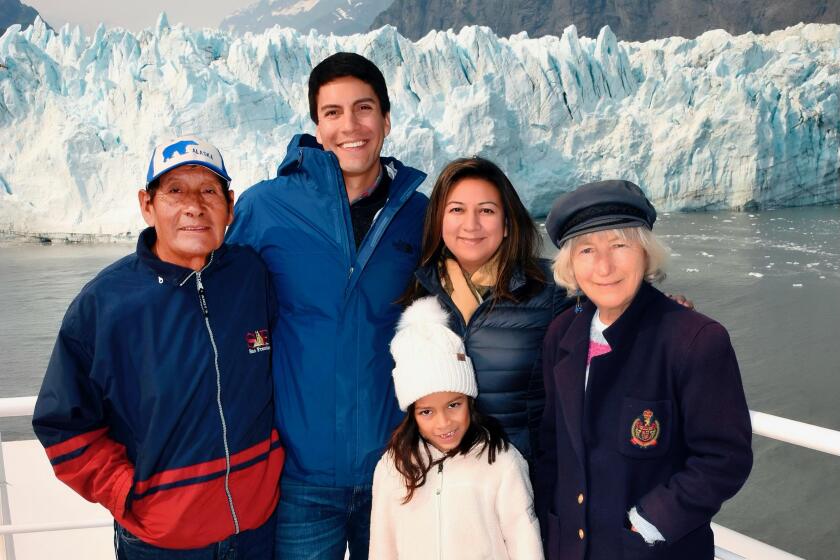
Death on the high seas: Cruise passengers face head winds with COVID lawsuits
Cruise giants Carnival, Princess, and Royal Caribbean — which face dozens of COVID-19 related lawsuits — have the legal upper-hand, experts say.
Nov. 3, 2021
Do I have to be vaccinated to go on a cruise?
The U.S. Centers for Disease Control and Prevention recommends all passengers be fully vaccinated before boarding a cruise ship. The world’s largest cruise companies now require passengers leaving U.S. ports to be fully vaccinated, with limited exceptions. Vaccines are required for passengers on Carnival , Princess , Royal Caribbean and Celebrity cruise lines.
You will usually be required to show proof of vaccination at the terminal before boarding. Some cruise lines will also require passengers — whether vaccinated or not — to show proof of a COVID-19 test taken within two days of boarding a vessel. Check the requirements and protocols of your particular cruise.
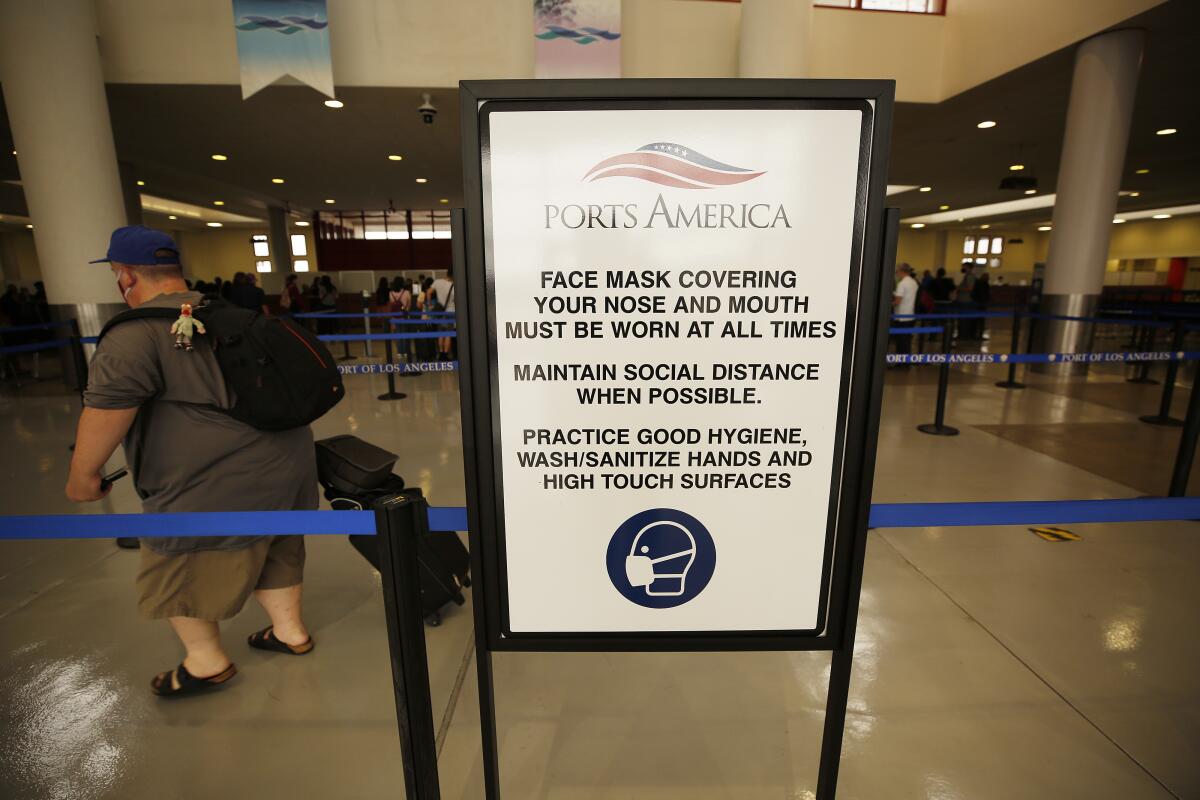
Do I have to wear a mask at all times on the ship?
Passengers are strongly encouraged to wear masks in public spaces and are required to do so in such indoor areas as elevators, stores, casinos and dining halls, except when eating or drinking. You typically won’t be required to wear masks around the pool and hot tubs, but deck chairs are spaced farther apart than in the past to maintain physical distance.
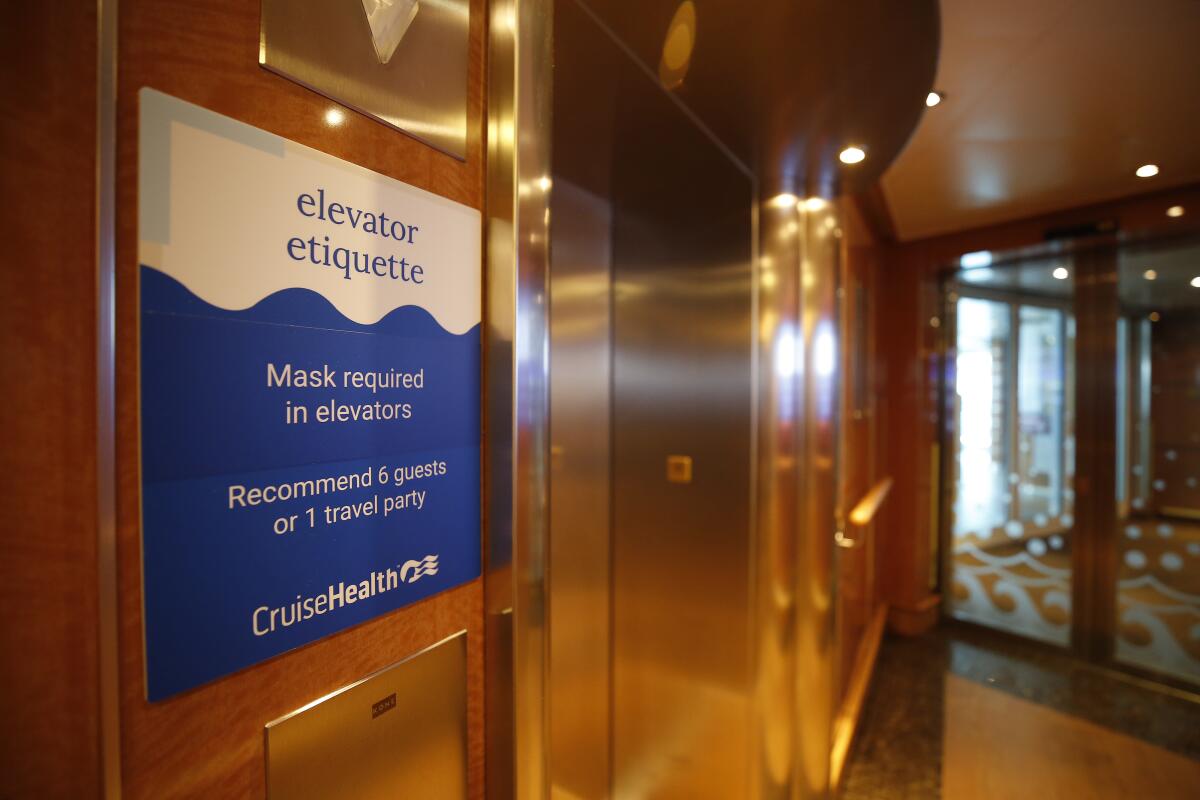
What about shore visits and excursions?
To go onshore, you must meet the health protocols of the country the ship visits. The government of the Bahamas, for example, recently announced that all cruise visitors must be fully vaccinated, with the exception of travelers under age 12 and those with medical exemptions.
On some ships, such as Carnival Cruises, unvaccinated passengers are not allowed to go onshore except with a pre-booked “bubble tour,” in which passengers travel with friends and family in a controlled environment. On other cruise lines, such as Holland America, shore excursions managed by the ship are strongly encouraged.
Are ships sailing at full capacity?
Most ships are sailing at less than full capacity, partly to encourage physical distancing. The Majestic Princess left on its maiden voyage from the Port of Los Angeles at about 60% capacity. The cruise lines plan to increase capacity over the next few months.
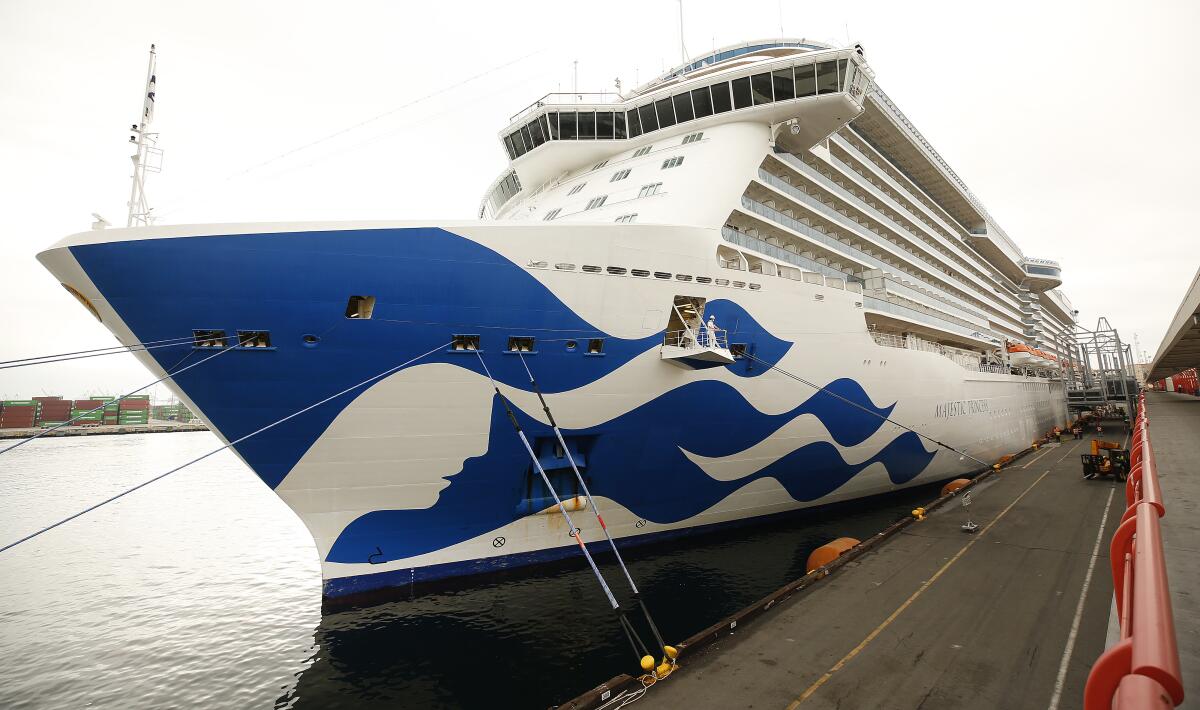
Have any activities been eliminated because of COVID-19?
You won’t be lining up at the buffet for meals. Most self-serve buffets have been modified so that employees serve passengers to avoid unnecessary crowding. Indoor dancing, karaoke and nightclubs are no longer allowed on many ships, including the Majestic Princess, which converted its karaoke area into extra room for spa treatments. On some ships, passengers won’t be allowed to try on clothing for sale. Physical distancing is encouraged for all activities.
Will I need to make reservations for dining and other onboard activities?
To manage capacity and physical distancing, many onboard restaurants recommend reservations and will limit groups at dining tables to eight. On Princess Cruises, reservations can be made through the MedallionClass app. On Celebrity Cruises, reservations can be made on the Celebrity Cruises App.
What else do I need to know?
You won’t be required to assemble at a designated spot on the ship to hear the pre-departure safety instruction, also known as the “safety muster drill.” Instead, passengers can watch parts of the safety drill on their stateroom televisions or on a cruise ship app.
Spas and gyms remain open, but some cruise lines limit them to vaccinated guests. Hand sanitizer stations can be found throughout the ships.
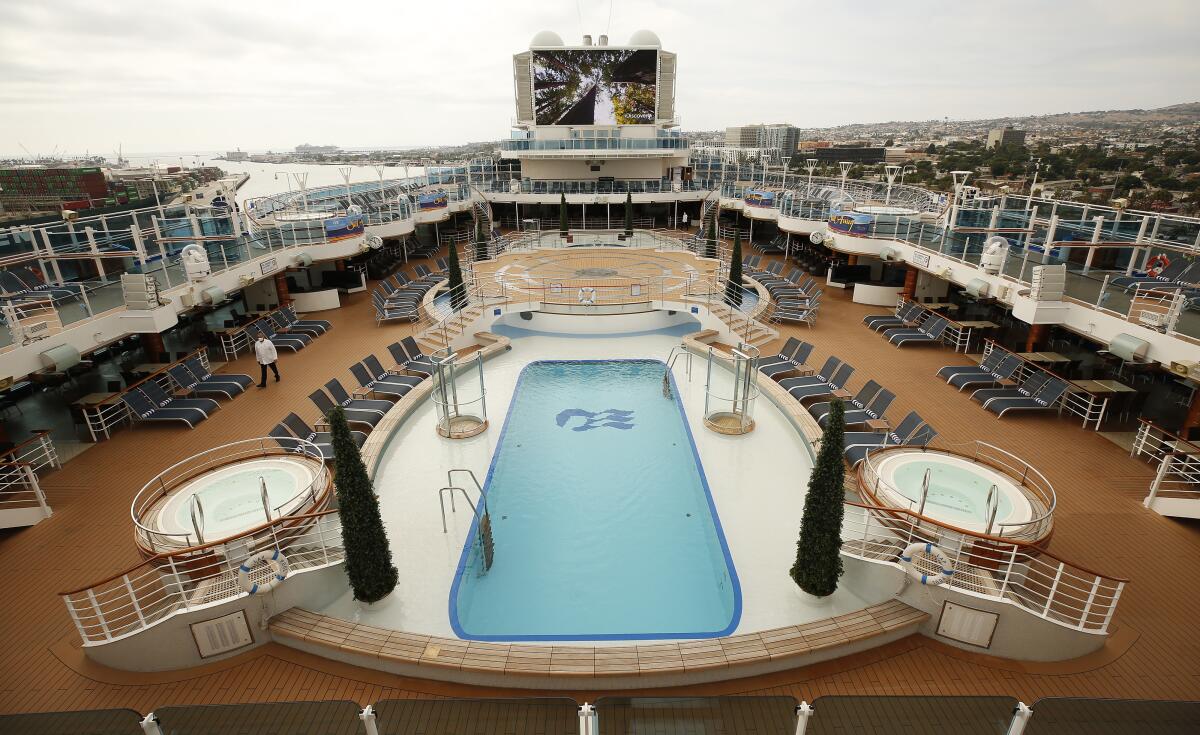
More to Read
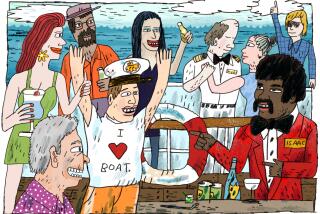
Where can you find your people? More travelers are looking to themed cruises
Jan. 11, 2023

Laura Benanti, Kristin Chenoweth, Alan Cumming board Broadway cruise for spring 2023
June 22, 2022
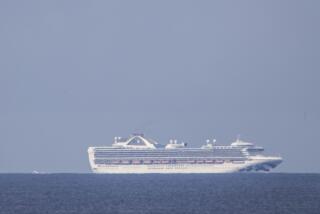
Guests and crew members test positive for COVID-19 aboard Princess Cruise ship
March 27, 2022

Hugo Martín is an assistant editor on the Fast Break Desk, the Los Angeles Times’ breaking news team. He has been a journalist with the Los Angeles Times for more than 30 years, covering politics, transportation, travel, business and the outdoors. A native Californian, Martín was part of the Metro staff that won Pulitzer Prizes in 1993, 1995 and 1998. He is an avid outdoorsman, a proud father and die-hard Lakers fan.
More From the Los Angeles Times

Hollywood Inc.
NBCUniversal’s Donna Langley on AI: ‘We’ve got to get the ethics of it right’
June 21, 2024

Wall Street coasts to the close of another winning week as Nvidia cools again

Former Ace Hotel in downtown L.A. reopens as ‘Airbnb on steroids’

California jobs picture brightens in May; unemployment drops for first time in many months
- Share full article
Advertisement
Supported by
Cases Rise, Criticism Mounts, but Ships Keep Cruising
One day after the C.D.C. advised against all travel on cruise ships, thousands of cruisers partied like it was 2019. But worries about onboard policies — and frustration over quarantines — are rising.

By Ceylan Yeginsu
On the fourth day of a seven-day Mexican Riviera cruise, Jesse Suphan and other passengers onboard the Carnival Cruise Line’s Panorama were denied entry at the port of Puerto Vallarta, because of the number of onboard coronavirus cases. That was the first Mr. Suphan heard about the virus spreading on the ship.
“The captain announced that five people had tested positive for Covid and were quarantining,” Mr. Suphan, a 39-year-old revenue cycle manager, recalled in a telephone interview. “But, then, talking to the crew, they told me there were between 100 and 150 crew members who also tested positive, but the captain didn’t mention that.”
Two days later, the Centers for Disease Control and Prevention told Americans to avoid travel on cruise ships, regardless of their vaccination status. The advisory, the agency’s highest coronavirus warning , came in response to a surge in cases in recent weeks, caused by the spread of the contagious Omicron variant.
But even as case numbers rise, and criticism mounts about the safety of cruising and over cruise line protocols in reporting cases to passengers, ships keep sailing and guests keep embarking, adamant that the onboard environment is safe because of stringent health and safety requirements, including pre-departure testing and vaccine mandates.
Consider the New Year’s Eve festivities held on ships around the world. One day after the C.D.C. announcement, as dozens of crew members and other passengers were confined to small cabins, infected and quarantined, thousands of revelers packed into ship bars, casinos and deck venues, partying like it was 2019.
Harvey Freid, 56, recently returned from a 17-day sailing to Antarctica, during which one positive case was reported. But Mr. Freid, an avid cruiser, is undeterred and is scheduled to go on a Caribbean cruise in late January.
“The cruise ships do a very good job of handling Covid, and I think it’s safer than my building in Miami and most places that I go on land, because people are vaccinated and cases are quickly identified and isolated,” he said.
On Wednesday, Royal Caribbean and Norwegian Cruise Line canceled several voyages in response to the growing number of coronavirus cases onboard some of their ships.
The cruise industry’s trade group, Cruise Lines International Association, called the C.D.C.’s warning “perplexing,” and said that cases identified on ships “consistently make up a slim minority of the total population on board — far fewer than on land.”
“No setting can be immune from this virus — however, it is also the case that cruises provide one of the highest levels of demonstrated mitigation against the virus,” the group said in a statement.
But some passengers are starting to question the effectiveness of health and safety protocols, and say they aren’t being informed of the full extent of coronavirus cases on board. They say they learn of the positive cases only after returning home and would have been able to make more informed decisions about their behavior and participation in activities, if they had been made more aware.
When Mr. Suphan booked his vacation, he felt confident that Carnival had good protocols in place, which included pre-departure testing and requiring vaccines for all crew and most passengers. But as the ship sailed, Mr. Suphan was surprised by the number of people he met who said they had been exempted from the vaccine mandate. He said there were not enough crew members to enforce indoor mask rules for more than 3,000 passengers on board.
Carnival said only a small number of passengers had been exempted from the vaccination requirement, but did not specify how many.
Mr. Suphan was also struck, he said, when a crew member told him that several infected crew were isolating on board when the ship departed from Long Beach.
“The fact that they had infected staff on board when the cruise left Long Beach means that they knew there was the possibility of more cases coming up after we left,” Mr. Suphan said. “But they still continued with the cruise so they could take everyone’s money. It feels like a cash grab to maintain payments.”
Carnival said four asymptomatic crew members were in quarantine when the cruise departed, while others had been taken off the ship.
Reporting positive cases
Most major cruise lines do not publicly announce the number of coronavirus cases on board their ships, but they are required to submit daily figures to the C.D.C. Currently, the agency is monitoring more than 90 cruise ships, because of reported cases that have reached the agency’s threshold for an investigation. (An investigation is undertaken when a certain number of cases is reported among a percentage of passengers.)
Carnival has denied that the number of infected crew was as high as 100 on Mr. Suphan’s sailing, but has not disclosed the total number of people who tested positive. On Dec. 28, when the cruise was denied entry to port, the Jalisco state health ministry said 69 cases had been detected among the ship’s 1,450 crew members. That day, Christine Duffy, the Carnival president, called into the ship and briefed guests on the situation. Passengers said she did not give updated figures for positive cases, which many found concerning.
Chris Chiames, chief communication officer for Carnival, said the company takes its responsibility for public health “very seriously” and has implemented protocols that exceed C.D.C. guidance since restarting operations in the United States in June.
“The extreme majority of the crew who test positive are asymptomatic and detected through the random testing protocol, and they and their close contacts are put into isolation or quarantine,” Mr. Chiames said. “None have required escalated medical attention or hospitalization, and we have also moved most crew off the ship to complete their isolation or quarantine.”
Carnival declined to comment on its policies for reporting daily cases to passengers onboard its ships, but Mr. Chiames said, “the additional complications caused by the fast-spreading Omicron variant will require us to evaluate how to communicate moving forward.”
Testing positive
For many, the idea of testing positive for the coronavirus on a cruise ship conjures up the horrors of the major outbreaks in the early stages of the pandemic, when thousands of people were confined to their rooms for endless days while the pandemic raged through the ships.
The health and safety protocols that allowed U.S. cruise ships to restart operations in June have helped cruise lines contain the virus and avoid large outbreaks, and until now, many of the small percentage of guests who tested positive during sailings have been satisfied with the handling of their cases. Some even received complimentary food and champagne to their rooms and were flown home by charter plane.
But since more contagious variants like Delta and Omicron have emerged, causing cases to increase among passengers and crew, guests have started to complain about quarantine conditions.
Richard Lewis, the chairman and chief executive of Savile Row Travel group, recently caught the coronavirus during two back-to-back Caribbean cruises with his family on board Celebrity Apex. It was his first cruise during the pandemic and initially, the protocols met his expectations and the experience felt relatively normal.
On day two of the cruise, the captain announced that there were two coronavirus cases on board the ship, which Mr. Lewis appreciated for keeping him informed. But there were no further announcements for the remainder of the week. That is when both he and his family started noticing changes.
“The staff were masking up a heck of a lot more, social distancing was being enforced between passengers and things did not seem right,” he said. “As we moved into the second week, some of the staff we became friends with disappeared and we found out they had gone into isolation. Then I started developing symptoms and tested positive and that’s when it became a nightmare.”
Mr. Lewis was moved from his “concierge class infinite veranda cabin” room to a standard cabin allotted for quarantines, which he said had a slightly oversized porthole and no fresh air. He had been under the impression that he could quarantine in his own room, saying the cruise line encourages people to book bigger rooms in the event that they will have to isolate.
Celebrity Cruises said its policy from day one was to move coronavirus-positive guests to a quarantine zone. Those identified as close contacts are permitted to isolate in their state rooms for 24 hours while they are tested and await results.
“Even the food was hideous,” Mr. Lewis said, sharing a picture of fried eggs, hash browns and bacon strips in a takeout container. ‘The first two meals were cold and appeared to have come from the crew canteen. It was only after I kicked up a fuss that I was allowed to order from the regular room service menu.”
That day, the captain announced that there were five coronavirus cases on board, but when Mr. Lewis pressed the doctor who visited him, he says he was told there were 16 cases.
“I know the cruise industry has suffered and I’m so supportive of getting travel back to normality, but there’s a serious lack of transparency and covering things up, and hiding them away is not going to help people make informed decisions,” Mr. Lewis said. Royal Caribbean Group, which owns Celebrity Cruises, said that passenger and crew members are informed when a threshold of virus cases has been met or exceeded.
“Publishing a dashboard of daily cases to all persons onboard is a less meaningful public-health mitigation measure than reinforcing continuous adherence to our industry-leading health and safety protocols, which has resulted in lower prevalence rates onboard than those found shoreside,” the company said in a statement.
Milly Parkinson, 28, developed coronavirus symptoms one day after returning from an eight-night Caribbean cruise with friends on board Royal Caribbean’s Odyssey of the Seas. While more than 50 people tested positive for the virus on board the ship, Royal Caribbean, like most cruise companies, does not require passengers to test before disembarking at their final destination.
“I took a test because I had symptoms, but think of all the people who were asymptomatic who just walked off the ship straight into the grocery store, a restaurant or a nightclub,” Ms. Parkinson said.
“We booked the cruise because we were convinced it would be a fun, safe bubble of vaccinated people,” she said. “But who were we kidding? There’s no place to escape Omicron.”
Follow New York Times Travel on Instagram , Twitter and Facebook . And sign up for our weekly Travel Dispatch newsletter to receive expert tips on traveling smarter and inspiration for your next vacation. Dreaming up a future getaway or just armchair traveling? Check out our 52 Places list for 2021 .
Ceylan Yeginsu is a London-based reporter. She joined The Times in 2013, and was previously a correspondent in Turkey covering politics, the migrant crisis, the Kurdish conflict, and the rise of Islamic State extremism in Syria and the region. More about Ceylan Yeginsu
Come Sail Away
Love them or hate them, cruises can provide a unique perspective on travel..
Cruise Ship Surprises: Here are five unexpected features on ships , some of which you hopefully won’t discover on your own.
Icon of the Seas: Our reporter joined thousands of passengers on the inaugural sailing of Royal Caribbean’s Icon of the Seas . The most surprising thing she found? Some actual peace and quiet .
Th ree-Year Cruise, Unraveled: The Life at Sea cruise was supposed to be the ultimate bucket-list experience : 382 port calls over 1,095 days. Here’s why those who signed up are seeking fraud charges instead.
TikTok’s Favorite New ‘Reality Show’: People on social media have turned the unwitting passengers of a nine-month world cruise into “cast members” overnight.
Dipping Their Toes: Younger generations of travelers are venturing onto ships for the first time . Many are saving money.
Cult Cruisers: These devoted cruise fanatics, most of them retirees, have one main goal: to almost never touch dry land .
Here's what you can expect if you get COVID-19 on a cruise ship according to a Royal Caribbean passenger who was given the option to quarantine on the ship even after the cruise ended
- Numerous cruise ships have lifted their COVID-19 vaccine and masking requirements.
- If a passenger contracts the virus, cruise ships offer medical treatment and future cruise credits.
- The CDC advises travellers to stay in their cabin and notify the onboard medical team if they get COVID-19.

With travel restrictions easing, cruise ships lifting their COVID-19 vaccine and masking requirements, and some cruise ships that our own Insider reporters found quite crowded , it begs the question: What happens if you contract the virus during your time aboard the ship?
Insider spoke with Matt Hochberg who has been on hundreds of cruises and runs a website called RoyalCaribbeanBlog.com that shares travel tips and advice for those interested in booking a cruise. The website has no affiliation with the cruise line of the same name.
In June, Hochberg was sailing on a Royal Caribbean ship in Alaska with his family when he began to have a scratchy throat. He brought his own COVID tests — something he advises passengers to do — and tested positive. He informed the cabin crew immediately and was then relegated to his cabin for the remainder of the trip.
The US Centers for Disease Control and Prevention advises travelers to stay in their cabin and notify the onboard medical team if symptoms of the virus occur.
Hochberg told Insider that the treatment he received during his time on the ship was fantastic. In less than an hour, a medical team consisting of a doctor and nurse tested him again as well as his family who tested negative. Both the medical team and the guest services team called him regularly to check on him. Doctors provided him with over-the-counter medication and the guest services team helped him plan his disembarkment process.
Because Hochberg became sick toward the end of his trip, he only had to isolate in his cabin for one day. Guest services provided him with numerous options for his disembarkment plan, including allowing him to stay on board and finish his quarantine until he tested negative. Hochberg decided to disembark where the ship was docked, in Vancouver, Canada, and drive his rental car back to the US.
While contracting COVID can happen anywhere, Hochberg's advice for those boarding a cruise is to be aware of the cruise line's policies and risks.
Related stories
"It's important to understand what could possibly happen because I think ignorance is not an excuse for anything at this point," he told Insider.
Medical attention and complimentary amenities on various cruise lines
Guests who test positive for COVID-19 on a Carnival cruise will need to isolate until their medical team says it is safe to resume activities, according to the company's website . Carnival offers regular visits from medical staff either in-person or through teleconsultation and guests will have access to complimentary amenities like Wi-Fi and room service.
Royal Caribbean
Depending on when you booked your cruise, passengers on Royal Caribbean ships will have access to varying COVID-19 assistance at no extra charge. For guests who made a reservation on or after August 8, 2022, Royal Caribbean will cover the costs of COVID-19-related medical treatments onboard if you test positive.
The company will also offer a pro-rated cruise fare refund if a cruise is cut short for reasons related to COVID-19, for cruises departing on or before September 30, 2022.
On October 21, Princess cruise line updated its COVID policy to welcome all guests, regardless of vaccination status. Anyone presenting symptoms of the virus during their time on board will be tested and reviewed by the company's medical staff.
According to the company's website , a positive case, that does not require admission to the ship's medical center or medical disembarkation, will be moved to a different cabin during the isolation period.
Celebrity cruises offer rapid testing and on-site medical teams. In the event that a guest contracts the virus on their vacation, the company will cover the cost of medical treatment onboard, and the person and their party can stay on the ship for free to complete any required quarantine plans.
Future cruise credits
Most cruise lines offer future cruise credits if a passenger gets sick with COVID-19, but Hochberg said that process has been challenging. Since his trip in June, he's only partially received his refund.
Despite getting the virus, he characterized his experience as positive.
"If you get sick on a cruise, they're going to take care of you. The care that I received was complimentary," he said.
In July, The Centers for Disease Control and Prevention ended its COVID-19 Program for Cruise Ships , putting the onus on cruise lines to create their own standards.
On Monday, Australian health authorities confirmed COVID-19 cases on the Coral Princess, one of the first major cruise liners to dock in Western Australia in over two years, according to The Australian Broadcasting Corporation .
Watch: This is what it takes to be a cruise ship performer
- Main content
National Geographic content straight to your inbox—sign up for our popular newsletters here

- CORONAVIRUS COVERAGE
How cruise lines are adapting to COVID-19 in the age of Omicron
The pandemic keeps disrupting the cruise industry. Here’s how to navigate if you plan to set sail.
The pandemic is upending the cruise industry once again.
In late December, just six months after cruise ships resumed sailing from United States ports, onboard cases of COVID-19 began to skyrocket—rising from 162 in the first two weeks of the month to 5,000 in the latter half of the month. As U.S. Centers for Disease Control and Prevention director Rochelle Walensky recently told lawmakers , it was about a 30-fold increase.
In the weeks that followed, the CDC warned travelers to avoid cruises even if they’re fully vaccinated . There has been a flurry of cancellations, including several Royal Caribbean and Norwegian Cruise Line sailings , because of crew members calling in sick and destinations closing their ports to cruises. The ships that do set sail have had to tighten their COVID-19 protocols—which include vaccine mandates, testing, and masking—and make last-minute itinerary changes.

Further complicating matters, the CDC’s Conditional Sailing Order—a framework of mandatory safety procedures for foreign-flagged ships in U.S. waters—expired on January 15. Following that guidance will now be optional for cruise ships, meaning they will be able to chart their own safety course.
For people who planned their trips months or even years before Omicron’s arrival, these rapidly changing circumstances have proven almost impossible to navigate around.
“People traveling at all right now have to be very flexible,” says Chris Gray Faust, managing editor of online industry publication Cruise Critic . “Dig into what your cruise line is requiring. What was the policy a month ago may not be the policy today.”
So how can travelers make sense of it all? Here’s what experts say.
How are COVID-19 protocols changing?
Eager to shed their early pandemic reputation as floating disease carriers, cruise lines worked with the CDC to institute fairly rigorous onboard COVID-19 protocols—the agency’s condition for allowing ships to sail from U.S. ports again. The CDC laid out guidance for testing crew and passengers and how to deal with outbreaks. Most cruise lines also instituted vaccine mandates.
( These photos show the surreal world of cruising during the pandemic’s height .)
Not much will change for the ships that participate in the CDC’s new voluntary program. They will still report COVID-19 data to the agency daily and follow specific testing regimes for passengers and crew. Cruise lines won’t get to choose which protocols to follow either, says Captain Aimee Treffiletti, head of the CDC’s maritime unit. If they choose to participate, they must agree to everything.
Norwegian Cruise Line has already indicated that it will join the CDC program. Brian Salerno, senior vice president of global maritime policy for the Cruise Lines International Association , expects many cruise lines will ultimately take part. He argues that cruise lines have often gone beyond CDC requirements—installing air purification technology or even onboard PCR testing laboratories —and aren’t likely to start slacking now.
“It’s a business imperative to do this right,” Salerno says. “Nobody’s going to relax during Omicron.”
It’s also a matter of public image. The CDC plans to continue issuing each ship a color-coded status that anyone can access to check transmission at any given time. Ships that are shaded green have no reported cases of COVID-19, while those that are shaded red are under CDC investigation. Cruise lines that aren’t part of the voluntary program will be shaded gray. Those ships may have their own health and safety protocols, but they haven’t been reviewed by the CDC.
“Nobody wants to be gray,” Salerno says. “Obviously everybody wants to be green.”
But with Omicron cases soaring, why is the CDC loosening its grip on the cruise industry? Treffiletti says the agency is confident that it has identified the best practices for mitigating transmission aboard a cruise ship—which she emphasizes was done in partnership with cruise lines. Now, she says, the CDC has decided to flex its regulatory authority “on a case-by-case basis rather than shutting down all the cruise ships at once.”
The CDC will still be able to board any ship in U.S. waters and conduct inspections, she points out. Ships that aren’t participating in the voluntary program will also have to report every case of COVID-19—just not every day—and will still be subject to the agency’s order requiring masks on public transportation .
How do the vaccine mandates work?
Most cruise lines currently require all passengers, including eligible children, to be fully vaccinated (meaning two doses of Pfizer or Moderna, one dose of Johnson & Johnson, or a WHO-approved equivalent). Salerno says the vaccination rates aboard cruise ships right now are close to 95 percent for passengers and crew members.
Some companies do accommodate children who haven’t gotten a jab: Royal Caribbean and Carnival, for example, require all guests older than 12 to be vaccinated , while younger passengers can board with a negative test. Disney Cruise Lines requires everyone over the age of five to be vaccinated. (The Walt Disney Company is the majority owner of National Geographic Partners.)

Cruise lines also align their vaccination policies with those of their destinations. So even though the United Kingdom considers children fully vaccinated after just one dose of an mRNA vaccine, a ship that sets sail to the Caribbean may only allow children who have had two doses.
Meanwhile, as Omicron spreads, some cruise lines have begun to require booster shots. Beginning February 1, Viking will require anyone who is eligible for a booster dose to get it at least 14 days before setting sail from the U.S. In addition, the CDC recently emphasized that being “up to date” on vaccines includes a booster dose.
Omicron is even more transmissible than the Delta variant—and better at evading vaccine immunity. But while the vaccines are no longer as effective at preventing you from getting infected, they are still the best protection, says Kathryn Willebrand, an epidemiologist who recently co-authored a study of COVID-19 transmission aboard cruise ships with infectious disease physician Lauren Pischel.
Willebrand points out that vaccines are still effective at preventing severe illness—which is especially important when you’re in the middle of the ocean on a boat whose medical staff might be overwhelmed or sick themselves. “You don’t want to need medical care when you’re far from home,” she says.
( Can booster shots protect you from Omicron? )

How often will you be tested?
Cruise lines have been requiring passengers and crew to test before boarding a ship, although specific requirements differ. Some only accept PCR tests, while others will accept the results of a rapid antigen test—in some cases only if the test is overseen by a health professional . And while some companies require you to get tested before you leave home, others administer tests at the terminal prior to boarding .
Crew members are generally subjected to routine testing throughout the voyage because they’re particularly vulnerable to infection. They spend more time on the ship, in closer quarters, and tend to have more interaction with others. But passengers might be required to test before any shore excursion if the port of call requires it, or if they develop symptoms during the trip.
If you don’t have any symptoms, you generally don’t have to be tested before disembarking the ship. Instead, Treffiletti and the CDC recommend getting tested five days after your trip. However, Gray Faust cautions that if you’re flying internationally, your final destination may require a negative test—or the cruise line may administer tests to everyone if there’s a particularly bad COVID-19 outbreak on board.
( 5 things to know about COVID-19 tests in the age of Omicron .)
What happens if there’s an outbreak?
Still, COVID-19 has proven adept at slipping past these protocols, particularly in the time of Omicron. Since COVID-19 is airborne and cruise ships are enclosed environments, the boats are higher risk environments for transmission, says Willebrand. Thousands of people pass through dining rooms, casinos, and other areas where virus particles may be hanging in the air.
Under the CDC guidance , cruise lines are supposed to educate both crew and passengers to identify and report COVID-19 symptoms. If someone onboard develops symptoms, they are tested and isolated until the results come back or until they’re no longer infectious. Those who are still infectious at the end of a journey are typically required to quarantine on shore—and Treffiletti says the CDC can work with cruise lines to facilitate that.
Since passengers are vaccinated, however, close contacts don’t necessarily have to quarantine unless they begin to develop symptoms. Gray Faust says cruise lines have been successful at contact tracing to notify those close contacts for the same reason that cruise ships are so vulnerable to transmission—they are closed communities.
“If you go to a restaurant and the person next to you is sick, you won’t know that,” Gray Faust says. “But on a ship, they do go back and find people. That is something that the cruise ships have developed that really is beyond what other types of travel have done.”
All of this relies on the honor system. Much as we’ve seen on land, there’s always the risk that your fellow seafarers may refuse to comply with mask mandates or hide their symptoms from crew to avoid quarantine. Cruise lines have the power to ask those passengers to disembark and travel home at their own expense.
Still, those rules aren’t always enforced—which is why experts say that the decision to set sail ultimately comes down to your own risk tolerance.
( Here’s what you need to know about traveling during Omicron . )
What can you do to ensure a smoother trip?
Although the CDC recommends that people avoid cruises, Treffiletti says that there are some things you can do to help mitigate your risk if you do decide to travel.
For one, before setting sail, check the color-coded chart on the CDC website to see if your ship is participating in the agency’s voluntary COVID-19 program. If so, you’ll be able to see whether there are any outbreaks on board. If things look grim, most cruise lines have implemented fairly flexible rebooking and cancellation policies.
If you’re just booking now, research the protocols of each cruise line to see if they align with your own comfort level. Gray Faust recommends purchasing trip delay and COVID-19 insurance—an extra cost that will be worth it if you get infected and can’t board your ship.
Gray Faust says your packing list should also account for uncertainties. She recommends packing extra clothing and medication in case you are quarantined at any point. If you can snag them, toss in some extra KN95 masks and rapid antigen tests, too.
But most of all, Gray Faust says cruisers need to go into a trip accepting that there will be health protocols in place—which might change as conditions worsen or improve—and that they’re there to keep you safe.
“You need to be OK with that,” she says. “You can still have a great trip. But you’re protecting yourself and other people by wearing masks and by getting your vaccines.”
National Geographic Expeditions and Adventures by Disney offer cruise departures to many destinations around the world. The Walt Disney Company is the majority owner of National Geographic Partners.
Amy McKeever is a senior writer and editor at National Geographic. You can find her on Twitter .
Related Topics
- CORONAVIRUS
- PUBLIC HEALTH
- CRUISE SHIPS
You May Also Like

11 of the best wildlife cruises for 2024 and beyond

In search of wildlife on a one-day cruise off the coast of Cornwall, UK
Fuel their curiosity with your gift.

In this one-house town, Alaska’s wilderness is at your fingertips

What it's like to cross Antarctica's Weddell Sea

How to spend 10 days exploring the Croatian islands

Shipwrecks, snorkelling and coral reefs: the Maldives by small-ship cruise

Is the cruise industry ready for the rise in solo travel?
- Perpetual Planet
- Environment
History & Culture
- History Magazine
- History & Culture
- Race in America
- Mind, Body, Wonder
- Paid Content
- Adventures Everywhere
- Terms of Use
- Privacy Policy
- Your US State Privacy Rights
- Children's Online Privacy Policy
- Interest-Based Ads
- About Nielsen Measurement
- Do Not Sell or Share My Personal Information
- Nat Geo Home
- Attend a Live Event
- Book a Trip
- Inspire Your Kids
- Shop Nat Geo
- Visit the D.C. Museum
- Learn About Our Impact
- Support Our Mission
- Advertise With Us
- Customer Service
- Renew Subscription
- Manage Your Subscription
- Work at Nat Geo
- Sign Up for Our Newsletters
- Contribute to Protect the Planet
Copyright © 1996-2015 National Geographic Society Copyright © 2015-2024 National Geographic Partners, LLC. All rights reserved
You are using an outdated browser. Upgrade your browser today or install Google Chrome Frame to better experience this site.
Cruise Ship Travel
CDC Respiratory Virus Guidance has been updated. The content of this page will be updated soon.
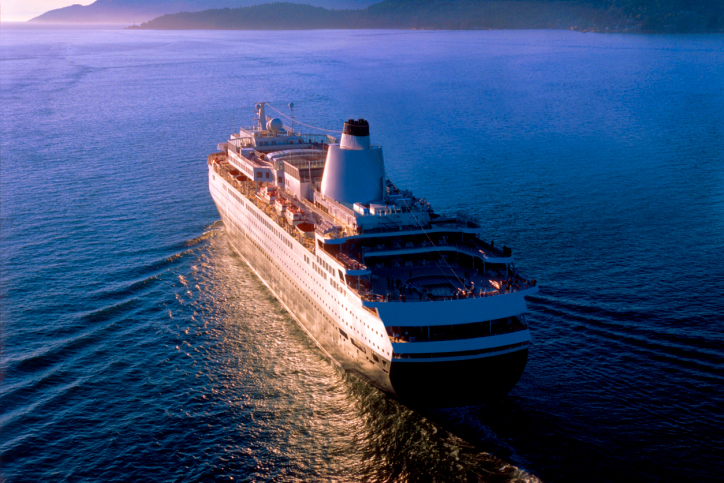
While cruising is a popular way to travel, there are some health concerns to be aware of. Find out more about health issues on cruises and steps you can take to stay safe and healthy during your trip.
If you are feeling sick before your voyage, do not travel and ask your cruise line about rescheduling or reimbursement options. If you feel sick during your voyage, report your symptoms to the ship’s medical center and follow their recommendations.
Common Health Concerns During Cruise Travel and what You Can Do to Prevent Illness
- Respiratory illnesses like influenza , COVID-19 , and the common cold. Get your annual flu shot and get up to date on your COVID-19 vaccines . Check directly with your cruise line about their COVID-19 testing or vaccination protocols before travel. If you have a weakened immune system , talk with your healthcare provider about your cruise travel plans. Wash your hands frequently or use hand sanitizer . When you cough or sneeze, cover your nose and mouth with a tissue to prevent spreading germs. Consider wearing a mask in crowded or poorly ventilated indoor areas.
- Norovirus. Symptoms of vomiting and diarrhea, primarily caused by outbreaks of norovirus, have been reported. To prevent norovirus , wash your hands with soap and water before eating and after using the bathroom, changing diapers, or touching things that other people have touched, such as stair railings. Avoid touching your face. For more information, visit CDC’s Vessel Sanitation Program website.
- Seasickness. Cruise ship passengers may experience seasickness or motion sickness. If you know you get seasick or think you may be likely to get seasick, talk to your healthcare provider about medicine to reduce your symptoms. Some common medications, including some antidepressants, painkillers, and birth control pills, can make seasickness worse.
- Sunburns. Apply sunscreen with SPF 15 or higher when traveling. Protecting yourself from the sun isn’t just for tropical beaches—you can get a sunburn even if it’s cloudy or cold.
- Bug bites. On your trip, use insect repellent and take other steps to avoid bug bites. Bugs, including mosquitoes and ticks, can spread diseases such as malaria, yellow fever, Zika, dengue, chikungunya, and Lyme. Many ships visit ports where these diseases are a concern.
Before Your Trip
Check CDC’s destination pages for travel health information . Check CDC’s webpage for your destination to see what vaccines or medicines you may need and what diseases or health risks are a concern at your destination.
Make sure you are up to date with all of your routine vaccines . Routine vaccinations protect you from infectious diseases that can spread quickly in groups of people. Outbreaks of chickenpox, influenza, and COVID-19 have been reported on cruise ships.
Many diseases prevented by routine vaccination are not common in the United States but are still common in other countries. Crew members and fellow travelers often board a cruise ship from destinations where some diseases are more common than in the United States or where vaccination is not routine.
Make an appointment with your healthcare provider or a travel health specialist that takes place at least one month before you leave. They can help you get destination-specific vaccines, medicines, and information. Discussing your health concerns, itinerary, and planned activities with your provider allows them to give more specific advice and recommendations.
Plan for the Unexpected
Prepare for any unexpected issues during your cruise ship travels with the following steps:
Prepare a travel health kit with items you may need, especially those items that may be difficult to find at your destination. Include your prescriptions and over-the-counter medicines in your travel health kit and take enough to last your entire trip, plus extra in case of travel delays. Depending on your destination you may also want to pack a mask , insect repellent , sunscreen (SPF15 or higher), aloe, alcohol-based hand sanitizer, water disinfection tablets, and your health insurance card.
Get travel insurance. Find out if your health insurance covers medical care abroad. Travelers are usually responsible for paying hospital and other medical expenses out of pocket at most destinations. Make sure you have a plan to get care overseas , in case you need it. Consider buying additional insurance that covers health care and emergency evacuation, especially if you will be traveling to remote areas.
If you need medical care abroad, see Getting Health Care During Travel .
After Travel

If you traveled and feel sick, particularly if you have a fever, talk to a healthcare provider and tell them about your travel. Avoid contact with other people while you are sick.
More Information
- Cruise Ship Travel in CDC Yellow Book
- Information for Cruise Ship Travelers
- Maritime Guidance
File Formats Help:
- Adobe PDF file
- Microsoft PowerPoint file
- Microsoft Word file
- Microsoft Excel file
- Audio/Video file
- Apple Quicktime file
- RealPlayer file
- Zip Archive file
Exit Notification / Disclaimer Policy
- The Centers for Disease Control and Prevention (CDC) cannot attest to the accuracy of a non-federal website.
- Linking to a non-federal website does not constitute an endorsement by CDC or any of its employees of the sponsors or the information and products presented on the website.
- You will be subject to the destination website's privacy policy when you follow the link.
- CDC is not responsible for Section 508 compliance (accessibility) on other federal or private website.
- Skip to main content
- Keyboard shortcuts for audio player

Coronavirus Updates
The coronavirus crisis, covid-19 outbreaks hit 3 cruise ships as florida breaks record for new cases.
The Associated Press

Employees of Nomi Health check in a long line of people for COVID-19 tests on Tuesday in North Miami, Fla. Marta Lavandier/AP hide caption
Employees of Nomi Health check in a long line of people for COVID-19 tests on Tuesday in North Miami, Fla.
MIAMI — A COVID-19 outbreak took place on a South Florida-based cruise ship for the third time this week, as the number of coronavirus cases in Florida hit its highest level since the start of the pandemic.
An undisclosed number of passengers and crew aboard the Carnival Freedom cruise caught the virus so the ship was denied entry to Bonaire and Aruba, Carnival said in a statement.

Thousands more flights canceled on Christmas Day, putting a damper on holiday travel
The ship has 2,497 passengers and 1,112 crew members and was scheduled to return to Miami on Sunday following an 8-day cruise. Passengers were required to be vaccinated and they were tested before leaving last Saturday, according to Carnival.
"Carnival Freedom is following all protocols and has a small number on board who are in isolation due to a positive COVID test," the statement said. "Our protocols anticipate this possibility and we implement them as necessary to protect the health and safety of our guests and crew."

48 tested positive for COVID-19 on Royal Caribbean cruise ship docking in Miami
Ashley Peterson, a passenger on the ship, tweeted a photo of a Dec. 22 letter from the ship's captain apologizing for being unable to make stops in Aruba and Bonaire. The letter said passengers would get $100 per room in onboard credit, as well refunds for planned excursions.
It was the third outbreak this week affecting cruise ships operated by Carnival and Royal Caribbean departing Miami and Fort Lauderdale.
Meanwhile, Florida had 31,758 new COVID-19 cases on Friday, breaking a record for the most cases in a single day since the start of the pandemic in the U.S. in March 2020, according to data from the U.S. Centers for Disease Control and Prevention.

Over a dozen COVID cases were found on a cruise ship that docked in New Orleans
The new record was driven by the spread of the new omicron variant through the Sunshine State.
The previous single-day highest number of cases was in last August, during the height of the delta variant wave in Florida, when 27,802 cases were reported.
- cruise ships
A .gov website belongs to an official government organization in the United States.
A lock ( ) or https:// means you've safely connected to the .gov website. Share sensitive information only on official, secure websites.
- Vessel Sanitation Program
- Stay Healthy on Your Cruise
- Meetings & Announcements
- Vessel Sanitation Training
- Data Summary
- Public Health Resources
- Addressing AGE on Cruise Ships
Allure of the Seas May 2024
At a glance.
Learn about the gastrointestinal illness outbreak on Royal Caribbean ship Allure of the Seas in May 2024, including outbreak details and actions taken in response.
Outbreak details
Cruise Line: Royal Caribbean International
Cruise Ship: Allure of the Seas
Voyage Dates: May 20–May 24, 2024
Voyage number: 31795
Number of passengers who reported being ill during the voyage out of total number of passengers onboard: 121 of 6,364 (1.90%)
Number of crew who reported being ill during the voyage out of total number of crew onboard: 3 of 2,143 (0.14%)
Predominant symptoms: diarrhea, vomiting, and abdominal cramps
Causative agent: unknown
Actions in response to the outbreak
In response to the outbreak, Royal Caribbean and the crew aboard the ship reported the following actions:
- Increased cleaning and disinfection procedures according to their outbreak prevention and response plan.
- Isolated ill passengers and crew.
A large number of cases were reported in a 12-hour period during the voyage, and many passengers reported similar symptoms and symptom onset times after travel. VSP reviewed the ship’s AGE logs and questionnaires detailing activities and meal locations for the 72 hours before that 12-hour period.
Tips for healthy cruising
Learn how passengers can protect themselves .
More information
Gastrointestinal illness is a commonly used term for acute gastroenteritis (AGE). Cruise ships report cases that meet our case definition for AGE. We define a reportable case of AGE as
- Three or more loose stools within a 24-hour period or what is more than normal for that person OR
- Vomiting along with one of the following symptoms: diarrhea, muscle ache, headache, abdominal cramp, or fever.
Case totals
Cases reported are totals for the entire voyage. It does not mean all people are sick at the same time, such as when they arrive or leave a port or ship.
The Vessel Sanitation Program helps the cruise ship industry prevent and control the introduction and spread of gastrointestinal illnesses on cruise ships.
For Everyone
Public health.
Find cars that meet your safety needs with AARP Auto Buying Program powered by TrueCar. Learn more.
AARP daily Crossword Puzzle
Hotels with AARP discounts
Life Insurance
AARP Dental Insurance Plans
AARP MEMBERSHIP
AARP Membership — $12 for your first year when you sign up for Automatic Renewal
Get instant access to members-only products, hundreds of discounts, a free second membership, and a subscription to AARP the Magazine. Find how much you can save in a year with a membership. Learn more.
- right_container
Work & Jobs
Social Security
AARP en Español
- Membership & Benefits
AARP Rewards
- AARP Rewards %{points}%
Conditions & Treatments
Drugs & Supplements
Health Care & Coverage
Health Benefits

AARP Hearing Center
Advice on Tinnitus and Hearing Loss

Get Happier
Creating Social Connections

Brain Health Resources
Tools and Explainers on Brain Health

Your Health
8 Major Health Risks for People 50+
Scams & Fraud
Personal Finance
Money Benefits

View and Report Scams in Your Area

AARP Foundation Tax-Aide
Free Tax Preparation Assistance

AARP Money Map
Get Your Finances Back on Track

How to Protect What You Collect
Small Business
Age Discrimination

Flexible Work
Freelance Jobs You Can Do From Home

AARP Skills Builder
Online Courses to Boost Your Career

31 Great Ways to Boost Your Career

ON-DEMAND WEBINARS
Tips to Enhance Your Job Search

Get More out of Your Benefits

When to Start Taking Social Security

10 Top Social Security FAQs

Social Security Benefits Calculator

Medicare Made Easy
Original vs. Medicare Advantage

Enrollment Guide
Step-by-Step Tool for First-Timers

Prescription Drugs
9 Biggest Changes Under New Rx Law

Medicare FAQs
Quick Answers to Your Top Questions
Care at Home
Financial & Legal
Life Balance

LONG-TERM CARE
Understanding Basics of LTC Insurance

State Guides
Assistance and Services in Your Area

Prepare to Care Guides
How to Develop a Caregiving Plan

End of Life
How to Cope With Grief, Loss
Recently Played
Word & Trivia
Atari® & Retro
Members Only
Staying Sharp
Mobile Apps
More About Games

Right Again! Trivia

Right Again! Trivia – Sports

Atari® Video Games

Throwback Thursday Crossword
Travel Tips
Vacation Ideas
Destinations
Travel Benefits

Outdoor Vacation Ideas
Camping Vacations

Plan Ahead for Summer Travel

AARP National Park Guide
Discover Canyonlands National Park

History & Culture
8 Amazing American Pilgrimages
Entertainment & Style
Family & Relationships
Personal Tech
Home & Living
Celebrities
Beauty & Style

Movies for Grownups
Summer Movie Preview

Jon Bon Jovi’s Long Journey Back

Looking Back
50 World Changers Turning 50

Sex & Dating
Spice Up Your Love Life

Friends & Family
How to Host a Fabulous Dessert Party

Home Technology
Caregiver’s Guide to Smart Home Tech

Virtual Community Center
Join Free Tech Help Events

Create a Hygge Haven

Soups to Comfort Your Soul
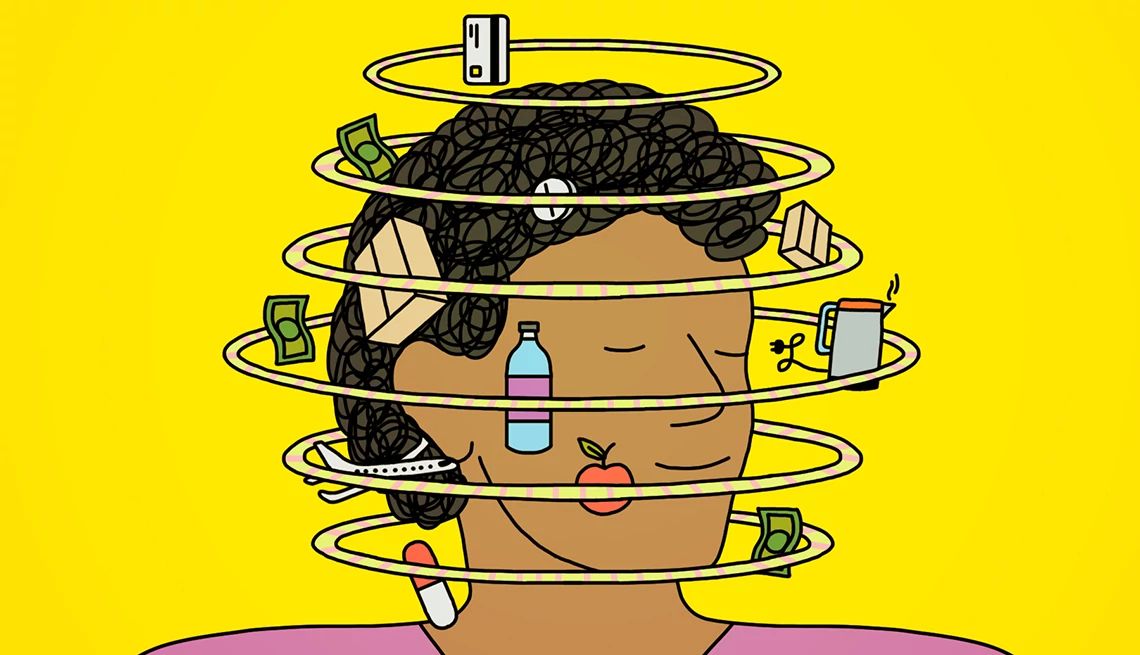
AARP Solves 25 of Your Problems
Driver Safety
Maintenance & Safety
Trends & Technology

AARP Smart Guide
How to Clean Your Car

We Need To Talk
Assess Your Loved One's Driving Skills

AARP Smart Driver Course

Building Resilience in Difficult Times

Tips for Finding Your Calm

Weight Loss After 50 Challenge

Cautionary Tales of Today's Biggest Scams

7 Top Podcasts for Armchair Travelers

Jean Chatzky: ‘Closing the Savings Gap’

Quick Digest of Today's Top News

AARP Top Tips for Navigating Life

Get Moving With Our Workout Series
You are now leaving AARP.org and going to a website that is not operated by AARP. A different privacy policy and terms of service will apply.
Go to Series Main Page
5 Illnesses You Can Get on a Cruise Ship (Besides COVID)
Plus, tips on how to avoid getting sick while at sea and ports of call.
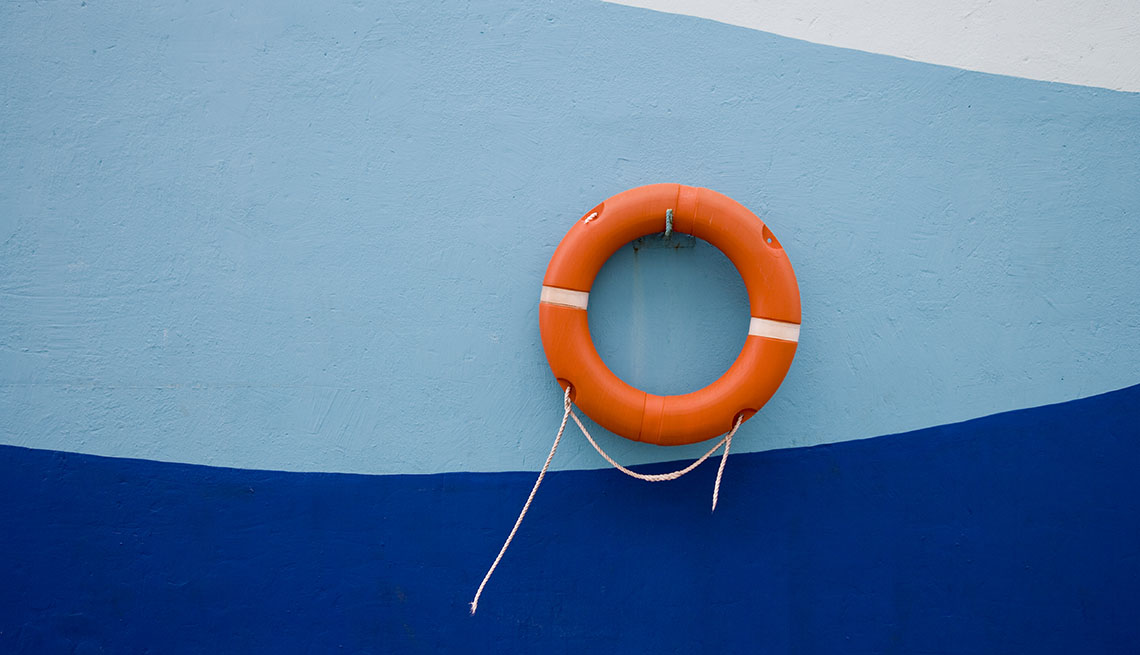
Rachel Nania and Nicole Gill Council,
Concerns over the spread of COVID-19 have loomed over the travel industry for the last three years, but with the public health emergency coming to an end and a robust menu of preventive tools and treatments available, many of those fears are fading.
A new AARP survey shows 81 percent of adults 50-plus who plan to travel in 2023 believe it’s safe to do so now, up from 77 percent in 2021. And while interest in cruising is down slightly among the 50-plus population this year compared to last, a recent AAA survey finds that, overall, the share of travelers considering a cruise vacation in 2023 is up.

Get instant access to members-only products and hundreds of discounts, a free second membership, and a subscription to AARP the Magazine. Find out how much you could save in a year with a membership. Learn more.
However, the return to the skies and seas does not mean COVID-19 is no longer a threat.
“Indoor densely populated places where we’re exchanging exhaled breath with one another is still going to be a concern for me,” says Wilbur Chen, M.D., adult infectious disease physician and director of the University of Maryland, Baltimore Travel Medicine Practice.
That concern isn’t limited to COVID, either. Flu spreads in a similar way, Chen points out.
It’s important to note, though, that since the start of the pandemic, many cruise lines have invested in better air circulation systems with medical-grade HEPA filters , says travel expert Pamela Kwiatkowski, cofounder and chief insurance officer at Goose Insurance Services in Vancouver, British Columbia. “I think that’s the first step they’ve taken in terms of improving the air filtration system, which removes almost all of the airborne pathogens,” she says.
Still, plenty of bugs can lurk on busy boats. Read on to discover some common illnesses you can pick up on a cruise — and what you can do to help keep yourself healthy on your next getaway.
1. Flu and other respiratory illnesses
Flu season spiked early this year in the U.S., along with another respiratory illness that can be particularly dangerous for older adults, respiratory syncytial virus, which is known as RSV . Cases of flu and RSV have declined from fall’s peak, data from the Centers for Disease Control and Prevention (CDC) shows, but the viruses that cause these two illnesses are still circulating in the U.S. and other parts of the globe.
“Influenza is complicated during cruise travel because, of course, people on a cruise ship — both the passengers and the crew — may come from different parts of the world, which means that the rates of influenza for your particular country may not necessarily be the same as in other places,” says Jose Lucar, M.D., an infectious disease physician and associate professor of medicine at the George Washington University School of Medicine and Health Sciences in Washington, D.C.
According to the CDC, flu season in the southern hemisphere, which includes Australia and parts of South America and Africa, typically runs April through September. In the tropics, flu flares up throughout the year.
Staying healthy: If you haven’t rolled up your sleeve for the flu shot yet, make sure you get it at least two weeks before going on a cruise, Lucar says. The same applies to the latest COVID booster . When it comes to RSV, there isn’t a vaccine yet, but the FDA could approve one soon.
A few other tips: If you’re at high risk for flu complications , talk to your doctor about antiviral treatment and prevention before your trip, the CDC recommends. Don’t forget about high-quality face masks, which can help to tamp down the spread of respiratory illnesses. And be sure to make — and pack — a list of all the medications you take, in case you wind up needing medical care on board. “That just makes it easier for everyone, so that if there is an emergency, if you’re not able to talk really well, you can at least hand the sheet over and it’s done,” Chen says.
2. Norovirus
This is one of the most well-known bugs that can foil fun on a ship. Norovirus — marked by diarrhea , vomiting, nausea and stomach pain — is to blame for more than 90 percent of diarrheal disease outbreaks on cruises, according to the CDC. That said, norovirus outbreaks on ships account for only 1 percent of all such reported cases.

AARP NEWSLETTERS

%{ newsLetterPromoText }%
%{ description }%
Privacy Policy
ARTICLE CONTINUES AFTER ADVERTISEMENT
“This infection is very contagious,” Lucar says. The virus is also a “hearty” one, Chen points out. It can survive for long periods of time on surfaces and is resistant to common disinfectants.
Close living quarters, shared bathrooms, populated pools, busy buffet lines and rapid turnover of passengers make it difficult to control the spread of the virus once it hits a ship. “It’s just really the perfect scenario for transmission of highly contagious GI [gastrointestinal] pathogens,” Lucar says.
AARP® Vision Plans from VSP™
Exclusive vision insurance plans designed for members and their families
According to the Cruise Lines International Association, the risk each year of getting laboratory-confirmed norovirus during a ship outbreak is about 1 in 5,500. The association, which says it is the largest cruise industry trade association in the world, noted on its website that crew members use strict sanitation and cleaning practices created with the CDC’s Vessel Sanitation Program. Cabins are cleaned once a day, and other common areas, such as elevators and pools, are cleaned multiple times a day.
In late February, more than 300 people aboard a Princess Cruises ship fell ill with diarrhea and vomiting, according to the CDC, though the agency didn’t cite the cause of the illness that sickened the 284 passengers and 34 crew. The Ruby Princess increased disinfection and cleaning procedures in the wake of the outbreak.
Other bugs that have popped up on boats include salmonella and E. coli. One to keep an eye on is shigella, which the CDC notes has been behind GI outbreaks on cruise ships. This bacterium causes an infection known as shigellosis, which can cause fever, stomach pain and diarrhea that can be bloody or prolonged.
Typically, the infection is treated with antibiotics, Chen says, but the CDC recently issued a warning that antibiotic-resistant strains are circulating in the U.S. Chen isn’t aware of any outbreaks of the resistant varieties on cruise ships, but it’s something to monitor.
Staying healthy: To avoid getting a GI bug, be sure to wash your hands with soap and water before eating and after going to the bathroom and coming into contact with high-touch surfaces, like doorknobs and stair railings. Hand sanitizers don’t work well against norovirus, Lucar notes.
Travel expert Kwiatkowski also recommends drinking plenty of water to keep your body running at its best. However, she advises passengers stay away from the water at ports, particularly if a passenger is vulnerable to gastrointestinal illnesses.
“Handwashing, cleaning your stateroom, watching what you eat and how much you eat, and making sure that you stay hydrated will go a long way in preventing these illnesses, from you catching them even if they are there,” she says.
Talk to a doctor or pharmacist about any medications you should pack, such as loperamide (Imodium) to help treat diarrhea or dimenhydrinate (Dramamine, Gravol) for nausea. If your immune system is compromised, your doctor may want to prescribe something ahead of your trip.
Although less common than respiratory and GI illnesses, measles, along with chicken pox and other vaccine-preventable diseases , can circulate on cruise ships.
Measles, a highly contagious virus that can linger in the air even hours after an infected person leaves the room, was declared eliminated from the U.S. in 2000, thanks to a successful vaccine program. But cases still pop up in the States, and the virus is common in many countries around the world.
If an unvaccinated or under-vaccinated passenger or crew member contracts the virus and brings it on board, other vulnerable people can get sick, Chen explains. (A ship was quarantined off the coast of St. Lucia in 2019 when measles was reported on board.) The same goes for chicken pox (varicella), which is similarly caused by a highly contagious virus that can circulate among unvaccinated people.
Staying healthy: To avoid these and other vaccine-preventable diseases, make sure you’re up to date on your routine vaccines before traveling. Two doses of the chicken pox vaccine are more than 90 percent effective at preventing the disease, and two doses of MMR (measles, mumps, rubella) are about 97 percent effective at preventing measles.

LEARN MORE ABOUT AARP MEMBERSHIP.
Get instant access to members-only products and hundreds of discounts, a free second membership, and a subscription to AARP the Magazine.
4. Seasickness
Is the motion of the ocean getting to you? Seasickness, while not contagious or related to an infection, can make you feel downright miserable. The good news: Most people recover quickly from seasickness, formally known as motion sickness, and there are medications that can help.
Motion sickness — which can cause dizziness, nausea and vomiting whether you’re on a boat, in a car or on a roller coaster — occurs when the movement you see is different from what your inner ear senses. Interestingly, adults 50 and older are less susceptible than younger adults and children, the CDC notes.
Staying healthy: If you’re prone to going a little green when you travel, talk to your doctor ahead of your trip about medications that can help with symptoms. Prescription and over-the-counter antihistamines — like dimenhydrinate (Dramamine), for example — are most frequently used to treat motion sickness.
However, antihistamines can interact with other medications and often cause drowsiness and decreased mental alertness, and the nonsedating ones appear to be less effective, the CDC says. Your doctor may also prescribe or recommend a patch that can help prevent nausea and vomiting caused by motion sickness.
Another tip: Have your physician review your current list of medications, since common pills — including some antidepressants and painkillers — can make seasickness worse, according to the CDC.
A few other things that can help with seasickness:
- Try lying down on your stomach, shutting your eyes or looking off into the horizon.
- Avoid the upper levels of the boat.
- Stay hydrated and limit alcohol and caffeine consumption.
- Avoid smoking . Even short-term cessation reduces your susceptibility to motion sickness, the CDC says.
- Distract yourself with music, controlled breathing or aromatherapy (try mint or lavender). Sucking on a flavored lozenge (some experts recommend a hard ginger candy) may also help, the CDC says.
- While the CDC says the scientific data on acupressure for seasickness is lacking, it works for some. You can find wrist bands for motion sickness in many drugstores.
5. Burns and bites
A word of advice from Lucar and Chen: Don’t forget the SPF when packing for your cruise. A burn on vacation can ruin your fun in the sun and put you at higher risk for skin cancer .
“Also, if you’re going to places that have a lot of insects and mosquitoes, make sure you wear your insect repellent so that you don’t get a bunch of bites, because we also are worried about malaria, dengue, chikungunya, Zika — those sorts of things — at ports of call,” Chen says.
Staying healthy: Opt for a sunscreen with an SPF of at least 15, the CDC recommends, and be sure your bottle says “blocks UVA and UVB” or “broad spectrum” on the label.
When it comes to insect repellent, look for a spray that’s registered with the Environmental Protection Agency. Layering it with sunscreen? Put the repellent on second, over the sunscreen, the CDC advises.
To ease any health-related concerns you might have before booking a cruise, Kwiatkowski suggests using a travel agent who is a cruise line expert or contacting the cruise line to ask about their cleaning protocols and track record. “I know it sounds like a lot of work,” she says, “but travel is a big investment, and you really want to travel worry-free.”
Rachel Nania writes about health care and health policy for AARP. Previously she was a reporter and editor for WTOP Radio in Washington, D.C. A recipient of a Gracie Award and a regional Edward R. Murrow Award, she also participated in a dementia fellowship with the National Press Foundation.
Nicole Gill Council is a writer and editor of travel and diversity, equity and inclusion content for aarp.org. Previously, she was a digital planning manager and a news editor at USA Today and Gannett News Service, and a copy editor at the Los Angeles Times and Newsday.
Discover AARP Members Only Access
Already a Member? Login

MORE FROM AARP
What You Need to Know About the New World of Cruising
The vessels are larger and more decked out than ever
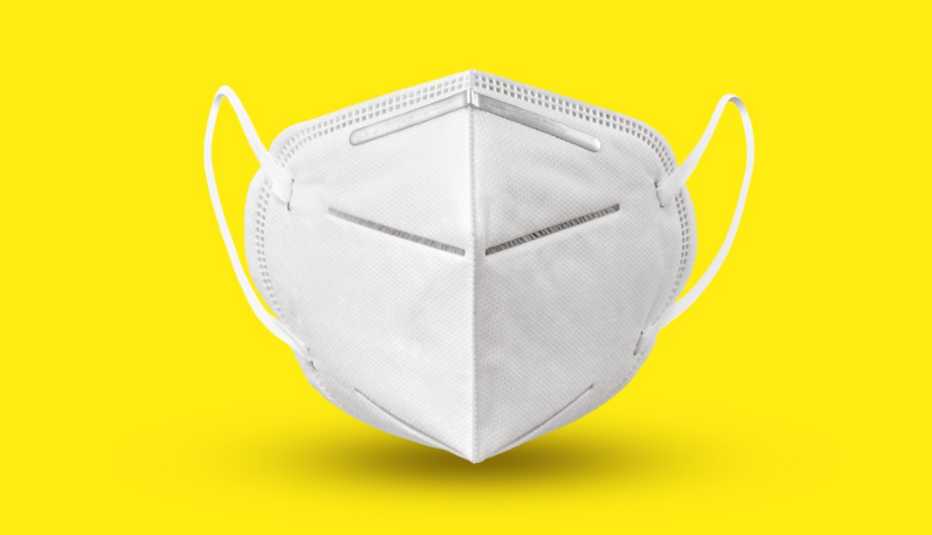
Benefits of Wearing a Face Mask Beyond COVID-19
From allergy relief to keeping your heart healthy
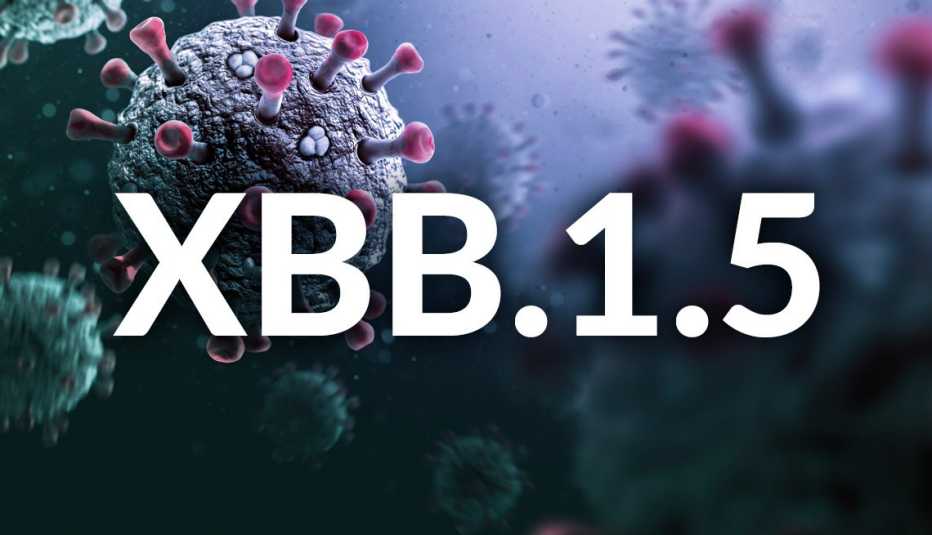
What You Need to Know About XBB.1.5
Details on the latest coronavirus variant
AARP VALUE &
MEMBER BENEFITS

Learn, earn and redeem points for rewards with our free loyalty program

AARP® Dental Insurance Plan administered by Delta Dental Insurance Company
Dental insurance plans for members and their families

The National Hearing Test
Members can take a free hearing test by phone

AARP® Staying Sharp®
Activities, recipes, challenges and more with full access to AARP Staying Sharp®
SAVE MONEY WITH THESE LIMITED-TIME OFFERS
Matador Original Series
What it's really like to catch covid on a cruise right now.
B ack in 2020, few things were scarier than catching COVID on a cruise ship. Today, it really isn’t so bad.
On November 26, 2023, I embarked on Holland America’s Nieuw Statendam for a 14-day transatlantic crossing. The voyage started from Rome, Italy, made stops in southern Spain and the Azores, and involved 10 days at sea, including seven consecutive days while crossing the ocean from Ponta Delgada, Azores, to Fort Lauderdale, Florida. Unfortunately, my last two days on board were spent masked and locked away in my cabin with what was likely COVID.
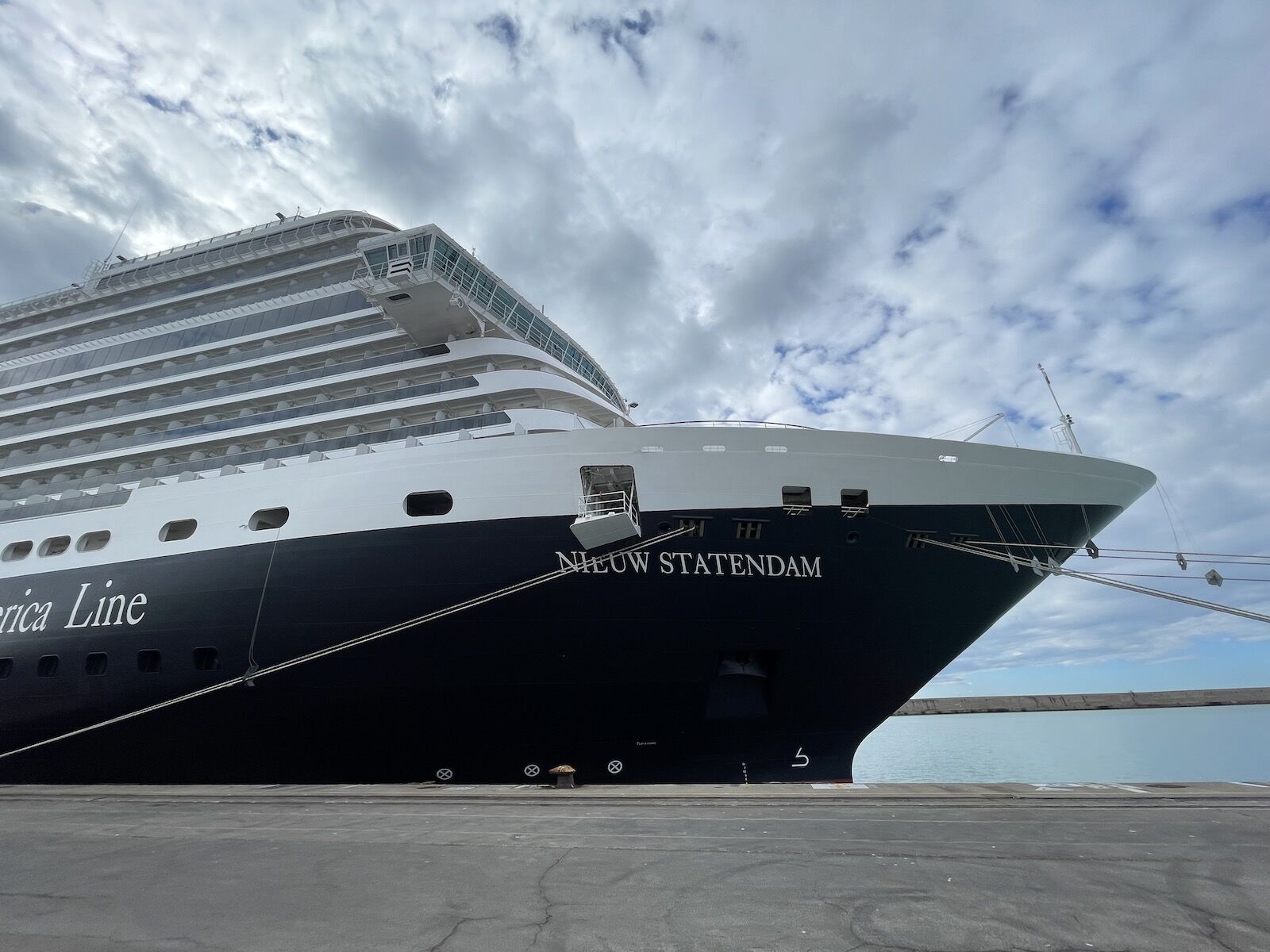
Holland America’s beautiful Nieuw Statendam. Photo: Jesse Adams
It was not the first time that I traveled with Holland America. Back in October 2022, my partner and I sailed to Alaska with the cruise line, and the trip was so perfect in every way that we decided to trust them with our vacation again.
Unlike what we experienced during our Alaskan cruise, however, this sailing was full or nearly full (the ship can accommodate around 2500 passengers), which means that the human density in common areas was much higher. The bars, dining venues, and the theater always felt busy.
Another significant difference between our October 2022 and December 2023 cruises was the level of COVID precautions required by the cruise line. Before boarding our Alaskan cruise, we had to provide proof of our COVID vaccination and the result of a negative COVID test, and while we did not have to wear masks during the sailing, every member of the crew did. This time around, nothing was required of us and the crew members did not wear masks. It was like being back in 2019 — except for the inordinate amount of people coughing and sniffling.
Holland America is, of course, not the only cruise eschewing to ask passengers to provide proof of vaccination or to get tested. Just about every single cruise line out there, just like every airline, resort, or hotel, is doing the same. The terror that COVID induced in us in the first two years of its existence is seemingly behind us. It’s made travel a lot less stressful and a lot more enjoyable. It’s made people a lot more careless, too.
This past November, it only took a few days on board the cruise ship for my partner and I to realize that some people were sick. Sick with what, however, we did not know and I’m not sure they did either. It could as easily be the common cold, bronchitis, as it could be COVID. Many people, whether on cruise ships or at home, have stopped testing themselves every time they have a runny nose or feel a little off.
Tested or not, COVID or not, what gets my goat, however, is when those who are sick decide that protecting others isn’t part of their agenda. On this trip, it seemed obvious that nobody remembered the basic rules of hygiene that we were all recently so careful to apply. Sick passengers on the ship rarely sneezed and coughed in their elbow, or washed their hands after blowing their nose or before enjoying a meal. Very few recalled that wearing a mask was a simple courtesy that could spare others from getting what they have.

The onboard theater where people were coughing, sneezing, and sniffling to their hearts’ content. Photo: Jesse Adams
Fewer than five days into our trip, my partner and I were spending anxious hours in the theater, bars, and lounges sitting as far away from the obviously unhealthy passengers and using hand sanitizers generously. We are not clean freaks or germaphobes, we just did not want our hard-earned vacations ruined.
But the inevitable happened anyway. Two days before our arrival in Florida, I woke up feeling poorly. I did not cough, I did not sneeze, I did not have a fever, but I did have a runny nose, had a headache, was tired and weak, and felt generally unwell. I made the decision to stay in my cabin until I felt better, and masked up and washed my hands as often as possible so that my partner stayed healthy. I enjoyed the movies available on the TV, the comfy bed, and the great ocean view from our balcony. I ordered room service and used the “Do not disturb” sign on the door so that crew members would not come in. I stayed in my cabin until it was time for me to leave the ship. By then, I felt better, but remained masked and as far away from others as possible until I got home.
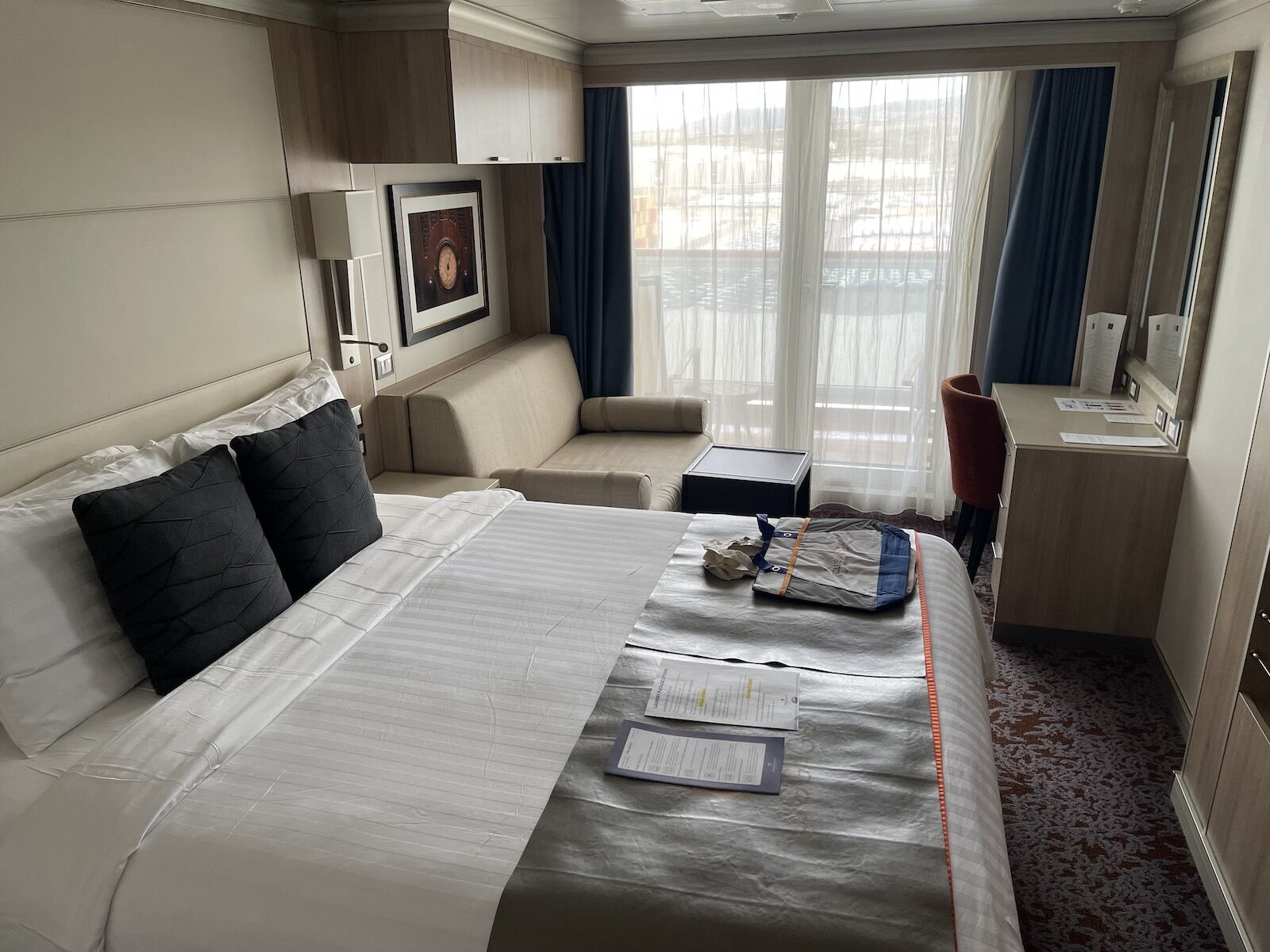
While neither the FAQs page nor the Travel Well section on Holland America’s website mentions what happens to passengers who catch COVID on their ships, cruisers who are active on online message boards Cruise Critic explain that isolation is still the standard procedure for those who feel sick during a voyage.
According to the participants on Cruise Critic, if you feel unwell during your Holland America cruise, a call to the medical center will allow you to get tested by a medical professional who will determine if you indeed have an infectious disease that requires you to stay in your cabin for a few days. On Holland America’s ship, the standard duration of the isolation period seems to be five days (just as the CDC recommends ), after which you get retested and examined to gauge whether or not you can mix up with the rest of the passengers again. Until recently, and according to the same message board, Holland America offered Future Cruise Credit (FCC) to those who need to isolate themselves for several days.
Other cruise lines have similar policies. According to their FAQs page , P&O requires a minimum of five days in isolation and offers FCC. The same goes for Virgin Voyages who requires passengers to isolate for an indeterminate amount of time and offers Future Voyage Credit (FVC) for the days spent in confinement.
However, not all cruise lines offer FCC. For example, according to their website, Cunard and Aurora Expeditions also requires several days of isolation for passengers testing positive for COVID but makes no mention of FCC.
Be mindful of the details of your travel insurance regarding COVID — some might cover the trip interruption due to the confinement — and inquire about COVID-specific protocols upon making your booking with a cruise line.
I’m pretty sure I know exactly who got me sick. A handful of days before my symptoms started, an elderly woman sitting a few feet away from me at the Dutch Cafe spent her time blowing her nose, coughing in my direction, and looking generally miserable. It seemed she had no qualms about spreading her germs onto others.
More like this
Trending now, how to explore iceland from its popular cruise ship ports (even without excursions), you can sail to antarctica on this tall ship - but it's nothing like a cruise, i tried nearly every cruise ship restaurant on 'the greatest foodie destination at sea', teenager leaves parents on an island after they miss their cruise departure, saudi arabia launches a new, alcohol-free cruise line, discover matador, adventure travel, train travel, national parks, beaches and islands, ski and snow.
We use cookies for analytics tracking and advertising from our partners.
For more information read our privacy policy .
Matador's Newsletter
Subscribe for exclusive city guides, travel videos, trip giveaways and more!
You've been signed up!
Follow us on social media.
- Search Please fill out this field.
- Manage Your Subscription
- Give a Gift Subscription
- Newsletters
- Sweepstakes
These Cruise Ships Have the Highest and Lowest Sanitation Scores in 2023
The CDC inspects ships twice a year to see how well they're maintaining standards
Which cruise ship is the cleanest? And which is more likely to leave you with gastrointestinal distress on your vacation itinerary?
The Centers for Disease Control (CDC) has released the results of its Vessel Sanitation Program inspections, showing which ships are the most sanitary, and which have room for improvement.
With a record high of 13 norovirus outbreaks on cruise ships this year (the highest number since 2012), prospective cruisers may want to take a look at the results before booking.
The CDC's inspections cover eight areas on the ship, including medical facilities, dining rooms, pools and spas, and child activity centers. The twice-a-year inspections result in a score out of 100; 85 or below is considered failing.
Celebrity Cruises
According to the CDC’s website, the following ships were all given a score of 100 in 2023.
Allure of the Seas, Royal Caribbean International
Carnival Celebration, Carnival Cruise Lines, Inc.
Carnival Panorama, Carnival Cruise Lines, Inc.
Carnival Sunshine, Carnival Cruise Lines, Inc.
Celebrity Edge, Celebrity Cruises
Celebrity Millennium, Celebrity Cruises
Celebrity Summit, Celebrity Cruises
Disney Fantasy, Disney Cruise Lines
Disney Wonder, Disney Cruise Lines
MSC Seascape, MSC Cruise Management (UK) Ltd
Norwegian Joy, Norwegian Cruise Lines
Norwegian Pearl, Norwegian Cruise Lines
Oceania Riviera, Oceania Cruises
Rotterdam, Holland America Line
Silver Moon, Silversea Cruises Ltd
While only one ship had a failing score, the MSC Seaside with a shocking 67 rating, the following ships were all given a score of 90 or below this year.
Noordam, Holland America Line: 90
Star Pride, Wind Star Cruises: 90
Le Boreal, Compagnie Du Ponant SA: 90
Norwegian Epic, Norwegian Cruise Lines: 89
Margaritaville at Sea Paradise, Margaritaville at Sea: 87
Carnival Liberty, Carnival Cruise Lines, Inc.: 86
Carnival Pride, Carnival Cruise Lines, Inc.: 86
MSC Seaside, MSC Cruise Management (UK): 67
Even a sanitation score of 100 doesn’t mean ships are immune to illnesses. A recent norovirus outbreak occurred in May on Celebrity Cruises’ Celebrity Summit, which earned a perfect score.
And even sanitation on board isn't a guarantee of an illness-free voyage. The most recent outbreak occurred in June on the Viking Neptune , during which 13% of the 838 passengers fell ill. However a Viking representative told CNN the passengers are not believed to have contracted the virus aboard the ship, but rather at “a shoreside restaurant in Iceland where a group of guests dined during their free time.”
Related Articles

Carnival Cruise Line reverses an unpopular Covid-era policy
W hile it's easy to forget (and some people don't want to remember) the Covid pandemic devastated the cruise industry. All sailings from U.S. ports stopped for a roughly 15-month period and when they returned, things were not the same.
Once the cruise lines got permission to sail again, it was — at least at first — under heavy restrictions from the Centers for Disease Control (CDC). Ships sailed at very limited capacity, social distancing was enforced, masks were required in indoor public spaces, and proof of vaccination was required.
Related: Carnival Cruise Line fixing broken (and very important) system
In addition to keeping people apart, the cruise lines also stepped up their cleaning regimen and tried to limit the amount of commonly touched services. For months, it seemed like multiple crew members did nothing but sanitize handrails, and tables could not be used until the had been properly cleaned.
Most cruise lines also largely eliminated paper on their ships. This included having menus and the daily schedule being available via QR codes, although paper menus were always offered for people who requested them.
Getting rid of printed daily schedules including Royal Caribbean's Cruise Compass and Carnival's Fun Times was a controversial decision. It's one that made sense for both safety and environmental reasons, and it also removed an expense for the cruise lines.
Passengers, however, did not like it, and both Royal Caribbean and Carnival have made some changes.
Sign up for the Come Cruise With Me newsletter to save money on your next (or your first) cruise.
Carnival brings pack the paper Fun Times
Royal Caribbean has largely continued to push passengers to use its app for its onboard schedule. You can usually request a paper copy of the Cruise Compass and sometimes they are offered at Guest Services.
Carnival Cruise Line ( CCL ) has fully reversed its pandemic-ear policy, according to a recent post from Brand Ambassador John Heald.
"Interesting to see that some people didn’t realize that we now have the paper copy of Fun Times" delivered to your cabin and as you see from today’s cover photo, they are available from the coffee shop as well," he shared.
Heald then asked his followers how they keep track of onboard activities, giving them four choices:
- A: I read the paper copy of the Fun Times Plus, and have it downloaded on the Hubb app.
- B: I only read the paper copy of the Fun Times.
- C: I only read the Fun Times from the Hubb app.
- D: I do not read the Fun Times.
Over 4,100 of Heald's followers voted and shared their opinions.
Be the first to see the best deals on cruises, special sailings, and more. Sign up for the Come Cruise With Me newsletter.
Most Carnival passengers want a paper Fun Times
"On the last few cruises I have learned how to use the Hubb app but I still enjoy coming back to the cabin at night and reading the Fun Times in bed to see what I am going to not miss the next day," wrote Susan Natale.
Many people seem to use both.
"I love both! And, I bring a highlighter to markup the paper copy. It makes my little nerd paper-loving heart happy," shared Linda Leon.
Other passengers like the paper version of the Fun Times as a keepsake.
"I actually grab it from guest services when I walk by not to use on the ship but to have a memory of all the fun events (one day I’ll put it all together in a scrapbook…eventually," added Sara Rose Curry.
Others like to be able to leave their phone in the room.
"I like having the paper copy so I don’t have to always carry my phone or any other device with me," wrote Linda Sargent Carraway.
Related: Carnival Cruise Line reverses an unpopular Covid-era policy
But while many people share those sentiments, others don't think the printed version should be left in every room.
"I am sad that the paper Fun Times is delivered to every cabin. It's a waste of paper for many people. Having it available for people who need it is one thing, going back to a paper copy for each cabin creates so much waste," posted Barbara J. Valentine.
Related: Get the best cruise tips, deals, and news on the ships from our expert cruiser
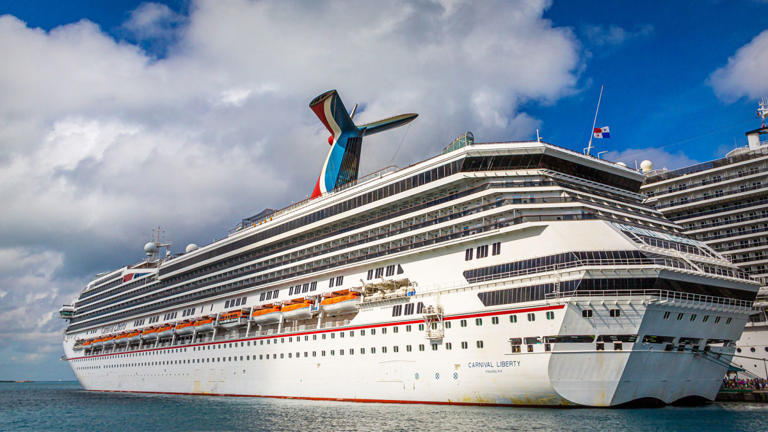
- CruiseMapper
- Cruise Ports
- Baltic - Norwegian Fjords - Russia Cruise Ports
Hellesylt (Norway)
Cruise port schedule, live map, terminals, news.

Region Baltic - Norwegian Fjords - Russia
Local Time 2024-06-23 02:37
Port Hellesylt cruise ship schedule shows timetable calendars of all arrival and departure dates by month. The port's schedule lists all ships (in links) with cruises going to or leaving from Hellesylt, Norway. To see the full itineraries (ports of call dates and arrival / departure times) and their lowest rates – just follow the corresponding ship-link.
Hellesylt is a port town in More og Romsdal, Norway. The town is located at the head of Sunnylvsfjorden (a branch of Storfjorden). The more popular Geirangerfjorden branches off near by. The small village has population under 500. The distance between Hellesylt and the other tender port Geiranger (Geirangerfjord) is approx 22 km (14 mi).
In the summer, thousands of tourists stay in or travel through Hellesylt each day. Most of them take the ferry to nearby Geiranger. During high season, the ferry runs every 1, 5 hours. The village is surrounded by valleys and mountains.
Hellesylt is under constant threat from the Akerneset mountain, which is about to erode into Sunnylvsfjord. A collapse could cause a tsunami destroying the town.
Hellesylt cruise terminal
Cruise ships to Hellesylt dock at the port's new cruise pier (1 berth capacity). Here can be berthed even the world's largest vessels. In rare cases, when the port is visited by more ships at a time, the other vessels are anchored and their passengers are transported via the ship's tender boats.
Often, both Norwegian cruise ports Hellesylt and Geiranger are itinerary-connected. The ship stops for a few hours at one of them to offload (tender) cruise passengers with booked tours there. At the other port, the ship docks to stay longer. Usually, passenger disembarkation is allowed at both ports.
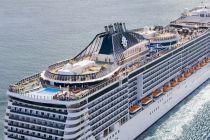
MSC Cruises opens summer 2024 itineraries for booking
MSC Cruises has unveiled its summer 2024 itineraries, now open for booking. The upcoming season will feature voyages by MSC Divina, MSC Lirica, MSC...
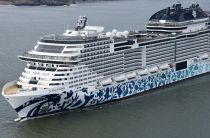
MSC Cruises opens bookings for MSC Euribia’s inaugural season
MSC Cruises opened sales for MSC Euribia - the fleet’s most environmentally advanced vessel and MSC's second LNG-powered ship. MSC Euribia is...

Crystal Endeavor yacht's 10-night "Journey of Vikings: Iceland and Norway" cruise starts on Sept 5
Crystal Cruises announced the next journey for the line's new expedition megayacht Crystal Endeavor, an itinerary exploring Iceland, the “Land...
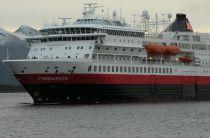
Person tests positive for COVID-19 onboard Hurtigruten’s ms Finnmarken
Hurtigruten has confirmed Saturday afternoon, September 19, that a person onboard its ms Finnmarken (Otto Sverdrup) ship had tested COVID...
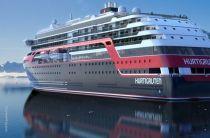
Tom Cruise hires GBP 0,5 million Hurtigruten cruise ship for Mission Impossible 7 crew
Tom Cruise has rented an entire cruise ship in order to prevent any more filming delays to his next "Mission: Impossible 7" movie production. The...
- show more news
Hellesylt - user reviews and comments

IMAGES
COMMENTS
Jul 9, 2023, 4:03 AM PDT. During a May voyage, 284 out of 2,797 passengers and crew members aboard the cruise ship Nieuw Amsterdam reported being ill, according to the Centers for Disease Control ...
The safety ratings. Of the 67 ships currently listed and rated as sailing with passengers and crew, crew-only or on simulated voyages, 40 are green with no reports of COVID- onboard; 13 ships are ...
The Ship Score of 100 report shows data on a rolling 12-month basis. Advanced Search | Ship Scored 100 | Green Sheet | CDC Home | VSP Home. Cruise Ship. Cruise Line. Date. Viking Polaris. Viking Epedition Operations. 4/2/2024.
As noted above, cruise lines also are requiring passengers to undergo COVID-19 tests before boarding ships -- a screening process that is keeping many COVID-19 positive people from ever stepping on board a vessel. When COVID-19 is detected on a ship, cruise lines sometimes then test passengers multiple times to ensure it isn't spreading.
Cruise lines have continued to modify their vaccination and testing policies surrounding COVID-19. As of the fall of 2022, many cruise line have dropped vaccination, testing and masking requirements.
Find a cruise. Departure Month. Any Month. From mask mandates and vaccines, to cruise cancellations and new protocols: Here's what cruisers need to know about COVID-19.
The CDC revised its guidance Thursday, as 91 cruise ships are under investigation for COVID outbreaks onboard. Most cruise lines require adult passengers to show proof of vaccination against COVID-19.
Most lines require adult passengers to show proof of vaccination against COVID-19. Cruise ships are allowed to relax measures such as mask use if at least 95% of passengers and 95% of crew are ...
All guests aged 4 and older are required to have a negative COVID-19 test before boarding. Crew will be tested regularly while on board. Guests who have certain pre-existing medical conditions ...
Nov. 3, 2021 5 AM PT. The cruise industry suffered its biggest financial blow in decades when the COVID-19 pandemic halted most sailings for months and made nervous cruise fans think twice about ...
Jan. 6, 2022. On the fourth day of a seven-day Mexican Riviera cruise, Jesse Suphan and other passengers onboard the Carnival Cruise Line's Panorama were denied entry at the port of Puerto ...
Early in 2020, in the early days of the COVID-19 pandemic, the disease spread to a number of cruise ships, with the nature of such ships - including crowded semi-enclosed areas, increased exposure to new environments, and limited medical resources - contributing to the heightened risk and rapid spread of the disease. [1]
The company will also offer a pro-rated cruise fare refund if a cruise is cut short for reasons related to COVID-19, for cruises departing on or before September 30, 2022. Princess
The pandemic is upending the cruise industry once again. In late December, just six months after cruise ships resumed sailing from United States ports, onboard cases of COVID-19 began to skyrocket ...
Here's why. Despite stringent measures supposed to minimize Covid outbreaks on ocean cruises, operator Royal Caribbean says at least 48 people on board one of its ships that docked in Miami at the ...
Respiratory illnesses like influenza, COVID-19, and the common cold. Get your annual flu shot and get up to date on your COVID-19 vaccines. Check directly with your cruise line about their COVID-19 testing or vaccination protocols before travel. If you have a weakened immune system, talk with your healthcare provider about your cruise travel plans.
An estimated 30 million passengers are transported on 272 cruise ships worldwide each year* (1).Cruise ships bring diverse populations into proximity for many days, facilitating transmission of respiratory illness (2).SARS-CoV-2, the virus that causes coronavirus disease (COVID-19) was first identified in Wuhan, China, in December 2019 and has since spread worldwide to at least 187 countries ...
It was the third outbreak this week affecting cruise ships operated by Carnival and Royal Caribbean departing Miami and Fort Lauderdale. Meanwhile, Florida had 31,758 new COVID-19 cases on Friday ...
Six guests have tested positive for Covid-19 on Royal Caribbean's Adventure of the Seas cruise ship, the cruise line confirmed Friday. Four of the guests are vaccinated and two are unvaccinated ...
Click on your favorite cruise line above, under "Jump to Section," to find out. For more cruise news, reviews and tips, sign up for TPG's new cruise newsletter .
Outbreak details. Cruise Line: Royal Caribbean International. Cruise Ship: Allure of the Seas Voyage Dates: May 20-May 24, 2024. Voyage number: 31795. Number of passengers who reported being ill during the voyage out of total number of passengers onboard: 121 of 6,364 (1.90%)
2. Norovirus. This is one of the most well-known bugs that can foil fun on a ship. Norovirus — marked by diarrhea, vomiting, nausea and stomach pain — is to blame for more than 90 percent of diarrheal disease outbreaks on cruises, according to the CDC.
B ack in 2020, few things were scarier than catching COVID on a cruise ship. Today, it really isn't so bad. On November 26, 2023, I embarked on Holland America's Nieuw Statendam for a 14-day transatlantic crossing. The voyage started from Rome, Italy, made stops in southern Spain and the Azores, and involved 10 days at sea, including seven consecutive days while crossing the ocean from ...
Find candid photos and detailed reviews of the Carnival Magic cruise ship. Find a Cruise; Deals; ... My hubby and I were quite excited about our 7th Carnival Cruise, our 1st post-COVID Carnival ...
According to the CDC's website, the following ships were all given a score of 100 in 2023. Carnival Celebration, Carnival Cruise Lines, Inc. Carnival Panorama, Carnival Cruise Lines, Inc ...
W hile it's easy to forget (and some people don't want to remember) the Covid pandemic devastated the cruise industry. All sailings from U.S. ports stopped for a roughly 15-month period and when ...
This is a dramatic 9.41% increase in cruise ship arrivals and a 51.26% surge in passenger numbers from 2022. ... Several European Ports Limit Cruise Tourism. Ever since the Covid-19 pandemic ended ...
Royal Caribbean COVID-19 Rules For the most up-to-date testing, masking, and vaccination requirements aboard Voyager of the Seas, please refer to Royal Caribbean .
Cruise ships to Hellesylt dock at the port's new cruise pier (1 berth capacity). Here can be berthed even the world's largest vessels. In rare cases, when the port is visited by more ships at a time, the other vessels are anchored and their passengers are transported via the ship's tender boats.
Celebrity Apex Cruise Review Apr 27-May 2 2024 Cruised 33 times since 1988, having taken cruises on Carnival, NCL, RCCL, and Princess, with a Covid-induced pause for a few years between 2020-2023.